KASELEHLIE PRESS
PO Box 2222 Kolonia, Pohnpei, FM 96941


PO Box 2222 Kolonia, Pohnpei, FM 96941

By Alex Rhowuniong Chikin Melele
and Bill Jaynes
The Kaselehlie Press
July 25, 2025
Washington D.C.—A citizen of the Federated States of Micronesia (FSM) believed by some to have been deported to the U.S. military detention facility in Guantánamo Bay, Cuba, is instead still in ICE custody in Arizona, according to a report by Alex Rhowuniong for the Chikin Melele blog.
Concerns were raised earlier this month following a July 8 CBS News report indicating that 72 immigration detainees with final deportation orders had been transferred to Guantánamo. The same
report noted that Marshallese and Micronesian nationals were among those detained, prompting urgent inquiries by FSM officials and members of the public. (also see article on page 3)
Rhowuniong reached out to FSM government representatives, including FSM Ambassador to the United States Jackson T. Soram, who responded via email.
“As of this evening, ICE has not confirmed to us if any of our FSM citizens are detained in Guantánamo,” Soram told Rhowuniong. “We know there was a mix-up earlier in the week with one individual presumed to be at GITMO, but after we registered our concerns and urged ICE to work with us, they informed us that the individual was actually detained in Miami, and not at GITMO. He has been returned to Arizona where he was originally detained.”

The first-ever US military flight carrying 18 Marshall Islanders deported from the United States by the US Immigration and Customs Enforcement arrived Majuro on June 10 this year.
Soram said that, as of the most recent correspondence, there is still no confirmation from ICE regarding FSM nationals being held at Guantánamo. “We are not aware of any of our FSM citizens detained at GITMO at the moment,” he said, adding that the Embassy will continue to work with ICE to obtain and verify information about FSM citizens in U.S. click here for continuation
By Bill Jaynes
The Kaselehlie Press
July 26, 2025
Pohnpei--The Pohnpei Supreme Court has sentenced Fijian national Miriama Naivalu Delai to eight years in prison, suspended under strict conditions, for her role in covering up the sexual abuse and resulting pregnancy of her underage daughter, who was impregnated by her own biological father.
Delai, who had been working in Pohnpei, was found guilty on seven of eight criminal counts, including conspiracy, solicitation, failure to report criminal activity, harassment, intimidation,
psychological abuse, and unlawful confinement of a family member. She was acquitted of a separate charge requiring mandatory reporting of child abuse, as the court determined she was not a legally defined mandatory reporter under Pohnpei law.
The court determined that Delai went to great lengths to conceal her daughter’s pregnancy and prevent the abuse from becoming known. The crimes came to light only after outside intervention. Her husband, the victim’s father, had already been tried, convicted, and sentenced for the incest-related crimes. He served a prison sentence in Pohnpei and was deported back to Fiji.
During the July 7 sentencing hearing,


the government was represented by Assistant Attorney General Elias Tyson, while Acting Public Defender Timoci Romanu represented the defendant. Judge J.D. Anson issued the judgment on July 11.
The sentences, all to be served consecutively, amount to eight years of incarceration and $5,500 in fines. Specifically, Delai received:
• Two years, six months imprisonment and a $1,000 fine for conspiracy to commit a crime;
• Six months imprisonment for solicitation to commit a crime;
• One year and $500 fine for compounding a crime;
• One year and $1,000 fine for
harassment;
• One year and $1,000 fine for intimidation;
• One year and $1,000 fine for psychological abuse;
• One year and $1,000 fine for unlawful confinement.
Despite the severity of the crimes, Judge Anson suspended the prison sentence, placing Delai on probation with several court-ordered conditions. She must obey all laws, surrender her passport, seek permission for any travel outside Pohnpei, report to a court marshal every three months, and pay her fines
click here for continuation



By Bill Jaynes
The Kaselehlie Press
July 25, 2025
Pohnpei—Attorneys representing the Speaker of the 23rd Congress of the Federated States of Micronesia (FSM), Esmond B. Moses, have filed a motion to dismiss a lawsuit brought by the Speaker of the Pohnpei State Legislature, Marvin P. Yamaguchi, and the 11th Pohnpei Legislature. The motion argues that the case fails to state a legal claim and should be dismissed with prejudice.
The dispute centers on Public Law No. 23-30, passed by the FSM Congress in 2023, which implements changes to the management and distribution of Compact of Free Association funds—particularly funds designated for infrastructure projects. The Pohnpei Legislature's complaint alleges that the national government overstepped its

and
P.O. Box 2222 Pohnpei, FM 96941 phone:(691) 320-6547 email: Kpress@mail.fm
Jaynes
authority, violating constitutional provisions and state rights.
In the motion filed by attorney Stephen V. Finnen, defendants argue that the FSM national government holds the constitutional power to implement and manage foreign financial assistance, including funds provided through the Amended Compact with the United States. The motion points out that neither Pohnpei nor any individual state is a party to the Compact agreement, which was signed by the President and ratified by Congress.
The plaintiffs claim that a resolution signed during a leadership meeting in Yap, known as CEC + PO Resolution No. 1, established an agreed-upon distribution formula for Compact funds—one that limited the national government’s share to 8%. The FSM Congress, however, passed legislation authorizing a 10% share, citing increased responsibilities and compliance costs under the amended Compact.
The defendants argue that the resolution is non-binding and holds no legal authority to constrain the actions
of Congress. They also argue that Speaker Moses did not have the power to unilaterally bind other members of Congress to the agreement.
Furthermore, the motion defends the national government's decision to centralize management of infrastructure funds, citing the amended Compact's new requirements for stricter reporting, third-party audits, and oversight. According to the motion, these responsibilities rightfully fall under the authority of the national government.
“The State may disagree with the approach of the National Government,” the motion states, “but it has not shown that it is unconstitutional or violates any due process rights.”
The motion to dismiss, filed under Rule 12(b)(6), asserts that the plaintiffs’ complaint presents no actionable legal claim and cannot be amended to do so. The defendants are asking the Supreme Court of the Federated States of Micronesia to dismiss the case entirely and with prejudice.
A decision by the court is pending.
By Bill Jaynes The Kaselehlie Press
July 25, 2025
Pohnpei—The Pohnpei State Legislature has passed a new law that strengthens access to healthcare for the island’s elderly population by waiving medical and dental fees for seniors and authorizing the issuance of official Senior ID Cards.
The legislation, passed on June 26, 2025, amends Section 1-110 of Title 17 of the Pohnpei Code, which governs fees for medical and dental services and pharmaceuticals provided by the Department of Health Services. It also adds a new section creating a framework for issuing Senior ID Cards, which will serve as official proof of eligibility for the newly established benefits.
Under the amended law, citizens and
permanent residents of Pohnpei who are 65 years of age or older will be eligible to receive free medical and dental care, along with prescribed pharmaceuticals, as long as these services are available through the Department of Health Services. The law explicitly states that care cannot be denied based on inability to pay and ensures that no distinction in treatment will be made based on payment status.
The new provision also directs the Chief of the Division of Social Services to provide Senior ID Cards at no cost. These ID cards will serve as official verification of age and eligibility under the healthcare fee waiver program.
The law takes effect immediately upon the Governor’s approval or automatically if not signed within the constitutional review period.

Reprinted with permission of Giff Johnson, Editor, Marshall Islands Journal / RNZ Pacific correspondent
Editor’s Note: “We confirmed in the middle of the night (Friday May 26), there was a FSM national being transferred to Guantanamomo”, Johnoson wrote when asked for permission to reprint his July 18 news story. “He was sent to Miami (where the field office is) but then returned to detainment in Arizona. (See front page article on the subject)
July 18, 2025
RMI—United States immigration and deportation enforcement continues to ramp up, affecting Marshallese and Micronesians in new and unprecedented ways.
The Trump administration's directive to Immigration and Customs Enforcement (ICE) to arrest and deport massive numbers of potentially illegal aliens, including those with convictions from decades past, is seeing Marshallese and Micronesians swept up by ICE.
The latest unprecedented development is Marshallese and Micronesians being removed from the United States to the offshore detention facility at the US Navy base in Guantanamo Bay - a facility set up to jail terrorists suspected of involvement in the 9/11 airplane attacks in the US in 2001.
Marshall Islands Ambassador to the US Charles Paul this week confirmed a media report that one Marshallese was currently incarcerated at Guantanamo, which is also known as "GTMO".
The same report from nationnews.com said 72 detainees from 26 countries had been sent to GTMO last week, including from the Marshall Islands and the Federated States of Micronesia.
A statement issued by the US Department of Homeland Security, which oversees ICE operations, concerning detention of foreigners with criminal records at GTMO said Homeland Security secretary Kristi Noem was using "every tool available to get criminal illegal aliens off our streets and out of our country."
But the action was criticized by a Marshallese advocate for citizens from the Compact countries in the US.
"As a Compact of Free Association
(COFA) advocate and ordinary indigenous citizen of the Marshallese Islands, I strongly condemn the detention of COFA migrants - including citizens from the Republic of the Marshall Islands - at the US Naval Base in Guantánamo Bay," Benson Gideon said in a social media post this week.
"This action raises urgent legal, constitutional, and ethical concerns that must be addressed without delay."
Since seeing the news about detention of a Marshallese in this US facility used to hold suspected terrorists, Ambassador Paul said he has "been in touch with ICE to repatriate one Marshallese being detained."
Paul said he was "awaiting all the documents pertaining to the criminal charges, but we were informed that the individual has several felony and misdemeanor convictions. We are working closely with ICE to expedite this process."
Gideon said bluntly the detention of the Marshallese was a breach of Compact treaty obligations.
"The COFA agreement guarantees fair treatment. Military detention undermines this commitment," he said.
Gideon listed the strong Marshallese links with the US - service in high numbers in the US military, hosting of the Kwajalein missile range, US military control of Marshall Islands ocean and air space - as examples of Marshallese contributions to the US.
"Despite these sacrifices, our people are being treated as criminals and confined in a facility historically associated with terrorism suspects," he said.
"I call on the US Embassy in Majuro to publicly address this injustice and work with federal agencies to ensure COFA Marshallese residents are treated with dignity and fairness.
"If we are good enough to host your missile ranges, fight in your military, and support your defense strategy, then we are good enough to be protected - not punished. Let justice, transparency, and respect prevail."
There were 72 immigration detainees at Guantanamo Bay, 58 of them classified as high-risk and 14 in the low-risk category, reported nationnews.com.
The report added that the criminal records of the detainees include convictions for homicide; sexual offenses, including against children; child pornography; assault with a weapon; kidnapping; drug smuggling; and robbery.
Civil rights advocates have called the detention of immigration detainees at Guantanamo Bay punitive and unlawful, arguing in an active lawsuit that federal law does not allow the government to hold those awaiting deportation outside of US territory.
In other US immigration and deportation developments:
• The delivery last month by US military aircraft of 18 Marshallese deported from the US and escorted by armed ICE agents is another example of the ramped-up deportation focus of the Trump administration. Since the early 2000s over 300 Marshall Islanders have been deported from the US. Prior to the Trump administration, past deportations were managed by US Marshals escorting deportees individually on commercial flights.
• According to Marshall Islands authorities, there have not been any deportations since the June 10 military flight to Majuro, suggesting that group deportations may be the way the Trump administration handles further deportations.
• Individual travelers flying into Honolulu whose passports note place of birth as Kiribati are reportedly now being refused entry. This reportedly happened to a Marshallese passport holder late last month who had previously traveled in and out of the US without issue.
Most Marshallese passport holders enjoy visa-free travel to the US, though there are different levels of access to the US based depending on if citizenship was gained through naturalization or a passport sales program in the 1980s and 1990s.
US Ambassador to the Marshall Islands Laura Stone said, however, that "the visa-free travel rules have not changed."
She said she could not speak to any individual traveler's situation without adequate information to evaluate the situation.
She pointed out that citizenship "acquired through naturalization, marriage, investment, adoption" have different rules. Stone urged all travelers to examine the rules carefully and determine their eligibility for visa-free travel.
"If they have a question, we would be happy to answer their enquiry at ConsMajuro@state.gov," she added.


By Bill Jaynes The Kaselehlie Press
July 25, 2025
Kitti, Pohnpei— The Pohnpei Office of the Public Auditor (POPA), in its performance audit of the Kitti Municipal Government (KMG), noted some improvements since the last audit but found that there “still exist risks for abuse, misuse, or theft of the Municipality’s funds.” The audit covered fiscal years 2023 and 2024, while the previous audit covered fiscal years 2019 and 2020.
POPA confirmed that collections amounting to $2,029,993 remitted to KMG were all deposited intact. However, though the Financial Management Act (FMA) requires funds received to be accounted for and banked daily, collected funds totaling $153,728.02 were deposited as much as 36 days after receipt. The auditors also observed a few instances
where collections were receipted after deposits.
Additionally, the auditors found that bank reconciliations were still not being performed, and that the Treasurer— who is involved in the recording and reviewing of all transactions—is also the sole signatory on KMG’s checking accounts.
Though the auditors found no loss of collections, they noted that current practices could lead to losses. They recommended better management oversight.
KMG's response said that it agreed with the finding and would require the Treasurer to strictly enforce the FMA on cash receipts. The response added that cash receipts are now reconciled by the Revenue Officer, the Accountant, and the Treasurer.
Auditors reviewed 400 selected cash disbursements and found 27 instances—totaling $47,770—where
Pohnpei Public Information
July 19, 2025
Pohnpei—In a momentous and historic event held on Friday, July 18, 2025, at the Governor's Conference Room in Peilapalap, the Honorable Herolyn S. Movick was officially sworn in as the Lieutenant Governor of the State of Pohnpei. She becomes the first woman to hold this office in Pohnpei's history.
In her remarks following the oath of office, Lt. Governor Movick pledged to work closely with Governor Stevenson A. Joseph to strengthen public services and improve government responsiveness to the needs of the people. Speaking directly to the Governor, she noted that he should expect open discussions and a variety of perspectives as they move forward together in leadership.
disbursements were not appropriately signed or supported with required documents such as vendor invoices, billings, receipts, receiving reports, or other applicable records. The finding showed that supervisory review is not done consistently to ensure all disbursements are appropriately supported and signed.
The management response agreed with this finding and reported the following changes:
• All disbursement requests now go through a verification checklist to ensure complete documentation and approvals;
• Finance and administrative staff will be fully trained on the FMA to understand its requirements;
• A pre-audit review process will be introduced to catch and correct errors before disbursement.
Auditors found that:
• Some payrolls lacked supporting documents such as timesheets;
• In eight instances of paid leave, five were not justified with relevant supporting documents, and three had approved leave forms that did not reflect plausible reasons for the leave;
• One instance involved a leave form that was not approved by the authorized person.
After acknowledging the finding, the management response said that KMG would take the following steps:
• All employees will be reminded that no leave—including one- or two-day absences—will be granted or processed without a signed leave request form;
• The Treasurer will review all payroll records to ensure that related payroll expenditures are supported by approved leave forms, attendance records, and timesheets;
• A payroll checklist will be implemented to confirm that all necessary documents are attached before processing each pay period.
POPA commended the Kitti Municipal Government for marked improvements since the last audit.
Notice is hereby given that TECNO TELECOM(HK)LIMITED
Marking a significant milestone for women and girls across Pohnpei, she stated, "The glass ceiling has been shattered." She encouraged women who feel the responsibility to lead to begin by earning the trust of their families and communities.
“Success must be earned, not expected or entitled,” she emphasized, calling for sincerity, proficiency, humility, and fortitude as essential leadership values.
Reflecting on her personal journey, she shared that one of her earliest "firsts" was being among the first cohort of female students at Xavier High School, a stepping stone that helped shape her commitment to public service.
To development partners and donors, Lt. Governor Movick sent a clear message: “We need your help, but using our own metrics—not global metrics.” Her statement emphasized the importance of culturally relevant, locally driven development priorities for the State of Pohnpei.
The swearing-in of Lt. Governor Movick marks a new chapter in Pohnpei’s leadership and history, inspiring a future of inclusive, responsible, and visionary governance.
Having just left her seat in the 11th Pohnpei Legislature, Lt. Governor Movick called on her former colleagues to support the administration and the implementation of the Pohnpei Strategic Development Plan. She underscored the importance of unified leadership, guided by the needs and aspirations of the people.
Flat N, 16/F., Block B, Universal Industrial Centre 19-25 Shan Mei Street, Fotan, New Territories Hong Kong
is the sole owner and proprietor in MICRONESIA of the trade mark shown below:

which is used upon or in connection with the following goods:
USB Cable; Computer Program (Downloadable Software); Computer Mouse; Docking Station; TWS Earbuds (or True Wireless Stereo Earbuds); Neckband Headphones; Wired Earphones; Bluetooth Speaker; Laptop Adapter (or AC Adapter); Smart Power Strip; Smart Band (or Fitness Tracker); VR Headset; Router; WiFi Camera; Smart Switch; Data Cable; WiFi Signal Receiver (or WiFi Dongle); Power Bank; Set-Top Box; Phone Case; Photovoltaic (PV) Equipment and Devices for Solar Power Generation; Smartphones; mobile telephones; batteries, electric; battery chargers; computers; notebook computers; tablet computers; computer hardware; computer software, recorded; data processing apparatus; computer keyboards; modems; mouse pads; protective films adapted for computer screens; sleeves for laptops; stands adapted for laptops; covers for tablet computers; bags adapted for laptops; headphones; smart speakers; chargers for mobile telephones; smartwatches; smartglasses; wireless routers; television apparatus; power banks; electric sockets; switches, electric; electric plugs; solar batteries; humanoid robots having communication and learning functions for assisting and entertaining people; protective films adapted for mobile telephone screens; junction boxes [electricity]
NOTICE IS ALSO HEREBY GIVEN THAT THE ABOVE OWNER CLAIMS ALL RIGHTS IN RESPECT OF THE ABOVE TRADE MARK AND WILL TAKE ALL LEGAL PROCEEDINGS AGAINST ANY PERSON, FIRM OR CORPORATION COUNTERFEITING, IMITATING, VIOLATING OR OTHERWISE INFRINGING THE SAID RIGHTS OF THE OWNER IN MICRONESIA
Any enquiries regarding the said trade mark may be referred to Ironside McDonald
By Bill Jaynes The Kaselehlie Press
July 25, 2025
Washington D.C.—The new U.S. law signed on July 4 by President Donald Trump—known as the "One Big Beautiful Bill Act" (OBBBA)— has introduced changes to some U.S. federal programs, but most benefits available to citizens of the Federated States of Micronesia (FSM) remain untouched, according to a statement released by the FSM Embassy in Washington D.C.
The embassy confirmed that while the majority of Compact-related programs are unchanged, FSM citizens residing in the United States will see new requirements for three key programs: Supplemental Nutrition Assistance Program (SNAP), Medicaid, and Pell Grants. These adjustments will be phased in between late 2026 and early 2027.
FSM citizens will continue to be eligible for SNAP, commonly known as food stamps. However, new work requirements will apply beginning December 31, 2026. Able-bodied adults without dependents will now have to meet work or training criteria until age 65, instead of the previous limit of 49. They must participate in employment, training, or volunteering for at least 20 hours per week to remain eligible.
Importantly, states will also be required to share information across state lines starting in 2028 to help enforce eligibility verification.
The OBBBA preserves FSM citizens’ access to Medicaid, but starting January 1, 2027, able-bodied adults without dependents will need to work, train, or volunteer for 80 hours per month to retain benefits. Several exemptions apply, including for those caring for young children, pregnant women, students, senior citizens, and individuals affected by medical or disaster-related hardships.
In terms of education, FSM citizens will still qualify for Pell Grants, the U.S. government’s largest need-based college aid program. However, new eligibility rules will take effect on July 1, 2026. The changes include:
Maximum awards going to students with a Student Aid Index below $2,700.
Parental and spousal income being factored into eligibility calculations.
Mandatory disclosure of private scholarships and grants.
Authorization for the U.S. Department of Education to revoke grants if students misuse funds or fail to maintain academic standing.
Most Programs
The embassy emphasized that eligibility remains unchanged for many major programs, including in-state tuition, Federal Work Study, TRIO educational assistance, Social Security Income (SSI), Low Income Home Energy Assistance Program (LIHEAP), and others. Key veteran services and access to FEMA assistance also remain intact.
Programs like Head Start and Temporary Assistance for Needy Families (TANF) are still available where authorized and funded, while judicial training and legal assistance initiatives for FSM citizens continue as before.
“The FSM Embassy team will continue to advocate for continued implementation of Compact-related benefits for FSM citizens,” the statement read.
The embassy also encouraged citizens to read the full text of the OBBBA, which is available from the U.S. Library of Congress, and to contact their nearest FSM embassy or consulate with any questions.

TRADE MARK
CAUTIONARY NOTICE
Notice is hereby given that our client, PayPal, Inc., a company organized and existing under the laws of Delaware and with a principal place of business at 2211 North First Street, San Jose, California 95131, United States of America, is the owner and sole proprietor of the following trademark in Micronesia:
Which is used in connection with the following:
Class Goods
9 Downloadable software for processing electronic payments and for transferring funds to and from others; downloadable software for facilitating money transfer services, electronic funds transfer services, bill payment remittance services, electronic processing and transmission of payments and payment data; downloadable computer software and downloadable mobile application software for facilitating electronic commerce transactions; downloadable software for use as a digital wallet; downloadable software for connecting digital wallets; downloadable software for connecting, integrating, and enabling transfer of funds between digital wallets and financial accounts; downloadable software for linking independent financial accounts and digital wallets, enabling migration of data and transfers of funds between independent third party financial accounts and digital wallets, and establishing secure connections between independent financial accounts and digital wallets; downloadable computer software for use for financial account management, namely, software for managing and facilitating financial transactions and funds transfers for bank accounts, credit card accounts, debit card accounts, and digital wallets; downloadable authentication software for controlling access to and communications with computers and computer networks; downloadable software for currency conversion.
35 Providing business information regarding money transfer services; business consulting services in the field of online payments; business managing and tracking credit card, debit card, ACH, prepaid cards, payment cards, and other forms of payment transactions via electronic communications networks for business purposes; business information management, namely, electronic reporting of business analytics relating to payment processing, authentication, tracking, and invoicing.
36 Electronic payment services involving electronic processing and subsequent transmission of bill payment data; Payment transaction processing services; providing electronic processing of electronic funds transfer, ACH, credit card, debit card, electronic check and electronic payments; financial information processing; money transfer services; electronic funds transfer services; bill payment services; providing a payment network for facilitating transactions from digital wallets; providing financial services, namely, bill payment services provided via a digital wallet and providing secure commercial transactions; transaction processing services for bank accounts, debit cards, and credit cards on embedded digital wallets, cross-border money transfers to banks and mobile wallets with real time currency exchange rates; clearing financial transactions via a global computer network and wireless networks; credit card and debit card transaction processing services; processing of electronic wallet payments; currency exchange services; electronic commerce payment services, namely, establishing funded accounts used to facilitate transactions and purchases on the internet.
42
Providing temporary use of online non-downloadable software for processing electronic payments and for transferring funds to and from others; Application Service Provider (ASP) featuring Application Programming Interface (API) software for facilitating payment transactions and financial information processing; providing temporary use of online non-downloadable software for facilitating money transfer services, electronic funds transfer services, bill payment remittance services, electronic processing and transmission of payments and payment data; providing temporary use of online non-downloadable software for facilitating electronic commerce transactions; providing temporary use of online non-downloadable software for use as a digital wallet; providing temporary use of online non-downloadable software for connecting digital wallets; providing temporary use of online nondownloadable software for connecting, integrating, and enabling transfer of funds between digital wallets and financial accounts; providing temporary use of online non-downloadable software for linking independent financial accounts and digital wallets, enabling migration of data and transfers of funds between independent third party financial accounts and digital wallets, and establishing secure connections between independent financial accounts and digital wallets; providing temporary use of online non-downloadable software for use for financial account management, namely, software for managing and facilitating financial transactions and funds transfers for bank accounts, credit card accounts, debit card accounts, and digital wallets; providing temporary use of online non-downloadable authentication software for controlling access to and communications with computers and computer networks; providing temporary use of online non-downloadable software for currency conversion.
Please take notice that PayPal, Inc., a company organized and existing under the laws of Delaware and with a principal place of business at 2211 North First Street, San Jose, California 95131, United States of America, attaches singular importance to its above referenced trademark and will immediately take the strongest legal actions to protect its intellectual property rights against any person(s) or business(es) found to be infringing those rights in Micronesia. Note that any infringing or unauthorized use of this mark will be met with civil and criminal action including injunctions, orders to seize, audits, full damages and costs.
Any inquiry regarding said trademark may be referred to the attorneys for PayPal, Inc. as follows:
Hilborne, Hawkin & Co.
2102 Business Center Dr, #2003
Irvine, California 92612
United States of America
Telephone: (714) 283-1155
Facsimile: (714) 283-1555
Email: info@hilbornehawkin.com

Central Implementation Unit, Department of Finance and Administration
July 17, 2025
Pohnpei, FSM—The Government of the Federated States of Micronesia (FSM) officially launched its new Revenue Management System (RMS) today, a major national milestone under the World Bank–supported
Public Financial Management (PFM) Project. Designed to modernize and strengthen the country’s capacity to collect and manage public revenue, the RMS is expected to improve service delivery, promote transparency, and reinforce citizen trust in government institutions.
The launch event, held at the FSM President’s Office in Palikir, brought together senior national leadership,
Pohnpei Public Information
July 23, 2025
Pohnpei—Governor Stevenson A. Joseph received the leadership and management team of the Micronesia Conservation Trust (MCT) during a courtesy visit to the Governor’s Office last week. The meeting was cordial, productive, and marked by a spirit of partnership and shared commitment to community development and environmental stewardship.

The MCT delegation included Ms. Mae Bruton Adams, Chief Executive Officer; Mr. Wilfred Mudong, Director of Government Relations and Partnerships; Ms. Drinette James, Terrestrial Program Manager; and Mr. Xner Luther, Project and Grants Manager.
During the visit, MCT officials shared a comprehensive overview of the Trust’s mission and work. As a nonpolitical, grant-making institution, MCT supports communities across Micronesia by writing and managing grants for conservation, climate change adaptation, and sustainable development. The team emphasized that MCT does not make decisions for communities but rather provides funding and technical support to ensure communities are equipped to lead and implement their own initiatives.
Governor Joseph thanked the MCT team for their continued support in Pohnpei and recognized their important role in channeling funding—such as through the Green Climate Fund (GCF)—to support grassroots efforts. He also expressed strong interest in expanding collaboration between MCT and the Pohnpei State Government, particularly through coordination with the State’s Resources and Development and Climate Change divisions.
Special attention was given to how MCT is uplifting women’s groups and preserving cultural values through community-based programs. Governor Joseph underscored the importance of ensuring that no community is left behind in efforts to build resilience and protect natural resources.
The visit reaffirmed a shared commitment to environmental preservation, sustainable livelihoods, and long-term community empowerment across Pohnpei and the Micronesian region.
development partners, and technology experts. The event opened with remarks by Hon. Rose N. Nakanaga, Secretary of Finance and Administration, followed by a keynote speech by Hon. Aren B. Palik, Vice President of the FSM. The representative from the Armenian firm IU Networks LLC, Mr. Artak Saghatelyan, the developers of the system, also spoke.
In his speech, Vice President Palik described the RMS as “a transformational tool that reflects our national commitment to good governance, improved compliance, and digital inclusion.” He noted that the new system will make a tangible difference for citizens nationwide. “A tour operator in Yap, a shopkeeper in Kosrae, a businesswoman in Pohnpei, or a hotel operator in Chuuk, will now be able to register, file, and pay taxes online, anywhere, anytime”. “That is a huge step forward,” he added, “This is about convenience, inclusion, and fairness”.
Secretary Nakanaga emphasized that the RMS represents more than a digital upgrade. “This system is a leap forward in how we manage public funds— ensuring that revenue is collected efficiently, recorded transparently, and used responsibly,” she stated. “Thanks to the RMS, taxpayers will be able to access their own information, confirm transactions digitally, and avoid the delays and paperwork that previously complicated compliance.”
The RMS automates key functions across the Customs and Tax Administration (CTA), including registration, return filing, payments, audits, refunds, and risk management. For tax authorities, it means less manual work, stronger compliance mechanisms, and better tools for policy design. “The system enables real-time monitoring and analytics,” said Vice President Palik. “We’ll be able to forecast revenues more accurately and use data to make smarter decisions.”
Following the speeches, the CTA conducted a live demonstration of the system, giving attendees a first look at its interface and core functionalities. The CTA team highlighted how the RMS supports risk-based audits,
improves cash flow management, and introduces new levels of transparency and accountability.
IUNetworks’ Project Manager, Mr. Artak Saghatelyan, praised the collaboration between the government and the technical team. “This project reflects a true partnership,” he said. “We worked closely with the FSM tax and customs officials to design a system that is not only technically robust but aligned with local realities and longterm goals.” He also acknowledged the dedication of the FSM’s project team, including key staff from the Department of Finance’s Customs and Tax Division, for their tireless contributions over the past year.
The RMS is part of a broader push by the FSM Government to modernize its public institutions and strengthen service delivery across sectors. The system is built to evolve over time, with the flexibility to adapt to future legal, operational, and policy changes. Moreover, it provides end-to-end functionality for tax administration — from registration and payments to audits and refunds — all through a unified digital interface. It also enables structured case management, automated compliance checks, and tailored taxpayer communication. The CTA conducted a live demonstration of the platform during the launch, showing how core services are now accessible remotely.
Today’s event builds on months of preparation, and years of research and development. Prior to golive, the Department of Finance and Administration led extensive online training sessions, and with IU Networks, conducted follow-up inperson workshops across all four FSM states. This hands-on training supports CTA staff in adopting the system and ensures smooth onboarding for taxpayers.
“This is not the end,” said Secretary Nakanaga in closing. “It is the beginning of a new chapter - one where our institutions are more responsive, our processes more efficient, and our citizens better served.”


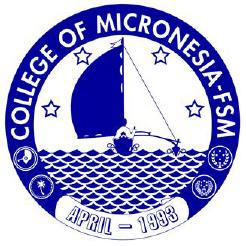
| Chuuk | Pohnpei | Kosrae
(YAP, FSM) July 28, 2025 – COM-FSM Yap Campus recently marked a significant quarter-century milestone, celebrating the 25th anniversary of its Upward Bound Program on July 19, 2025. The event also honored the latest cohort of students graduating from the program’s Summer Bridge component. Established in 2000 under the leadership of then-Dean Lourdes Roboman, the Upward Bound Program at the College of Micronesia-FSM Yap Campus has been instrumental in supporting first-generation and low-income students from Yap High
School. Funded by the U.S. Department of Education, the program delivers comprehensive academic, personal, and social services designed to prepare participants for successful transitions to higher education. A cornerstone of the Upward Bound initiative is the Summer Bridge program, which provides high school students with a unique opportunity to engage in on-campus, college-level coursework. This immersive experience allows students to acclimate to a university environment, enhance their self-assurance, and earn academic credits, thereby

smoothing their progression from high school to higher education. The 2025 celebration not only paid tribute to the program’s enduring legacy over the past 25 years but also recognized the accomplishments of this year’s
Accountant IV (Pohnpei)
Provides oversight to the accounts payable, accounts receivable and payroll areas of the Business Office. Performs account reconciliations and prepares financial statements regularly. Prepares monthly bank reconciliations for all cash accounts. Records adjusting journal entries on all reconciling items for the books to reconcile with the bank balance. Reviews and verifies journal entries on payroll reports and ensure accuracy of amounts and statutory deductions.
Teaching 12 to 15 contact hours with one to four preparations in the area of science teaching courses primarily in chemistry and other natural science courses within qualification of the candidate. Teaching classes in accordance with the goals and objectives of the course as described in the course outline. Maintaining accurate records of student attendance and student learning outcome/grades, in accordance with COM-FSM regulations.
The College of Micronesia - FSM is an equal opportunity employer. FSM Citizens are encouraged to apply


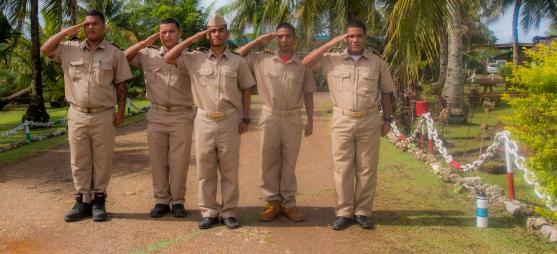




July 22, 2025
Pohnpei—Shelly Lebehn Amor, from Pohnpei State, in the Federated States of Micronesia, has been part of The Nature Conservancy (TNC) for over 28 years. She is TNC Micronesia and Polynesia’s longest-serving staff member, and as Operations Specialist, she keeps projects running smoothly by managing contracts, grants, and administrative processes.
Shelly works closely with project managers to draft agreements, collect required information, and track deliverables while ensuring that all agreements follow TNC policies and local regulations. Her work may happen mostly behind the scenes, but it is essential to making conservation efforts possible across the region.
After college, Shelly worked briefly as a file clerk until her sister encouraged her to apply for an administrative assistant position with TNC’s Watershed Project, one of TNC’s first initiatives in Pohnpei.
The work quickly sparked her interest in conservation, especially Bill Raynor’s (then Pacific Division Director) strong commitment to conservation and community engagement. When offered a permanent position after the project ended, she accepted without hesitation.
Looking back, the Watershed Project still holds a special place in her heart. While her main responsibilities were administrative, her supervisor encouraged her to join community meetings. “I got to meet local leaders and hear directly from community members,” she recalls. “There was a strong sense of respect and shared purpose, and I learned a lot from those interactions.”
Shelly holds an associate’s degree in business administration and has completed training in ecotourism as well as an open water dive certification during her early years with TNC. Outside of work, she enjoys spending time with her son and grandchildren, going out on the boat, swimming, snorkeling, and doing house chores together.

dedication and deep understanding of TNC’s processes have made her an essential part of the team and helped lay the foundation for decades of successful conservation work.


International Organization for Migration
July 17, 2025
Pohnpei—The Pohnpei State Legislature has formally recognized the International Organization for Migration (IOM) for its deep and lasting contributions to disaster preparedness and response across the Federated States of Micronesia (FSM). Through a resolution passed on 3 June 2025, lawmakers commended IOM’s commitment to protecting lives, reducing disaster risks, and reaching communities often left behind.
“No one should be left behind because of where they live or how hard they are to reach,” said Salvatore Sortino, IOM Micronesia Chief of Mission, during the ceremony with Speaker of
the Legislature, Honourable Marvin T. Yamaguchi. “This recognition reflects years of close collaboration between IOM, authorities, and the people of Pohnpei and FSM at large. We remain committed to standing with communities as they recover, rebuild, and adapt to growing climate challenges.”
For over 15 years, IOM has worked across the North Pacific to prepare for and respond to emergencies, while promoting safe and inclusive migration. Its work has helped communities adapt to increasingly frequent extreme weather events and rising climate threats, with a focus on those most at risk.
The resolution also acknowledges IOM’s post-disaster recovery support following Typhoons Maysak, Jelawat, and Wutip, including the reconstruction of hundreds of homes and public
OFFICE OF THE NATIONAL PUBLIC AUDITOR Request for Proposal (RFP)
Qualified Auditors to Perform Annual Single Audits of the Federated States of Micronesia
Fiscal Years ending September 30, 2025 & 2026
The Office of the National Public Auditor for the Federated States of Micronesia invites interested professional accounting firms to submit written proposals to conduct the annual single audits of the National and Four State Governments of the Federated States of Micronesia for fiscal year s ending September 30, 2025 & 2026
The single audits will include financial and compliance audits of the Federated States of Micronesia pursuant to the Single Audit Act of 1984, as amended, OMB Circular A-133, OMB Super Circular, and the Amended Compact of Free Association between the Federated States of Micronesia and the United States of America, for Fiscal Years 2025 & 2026
The audits will cover each reporting entity of the Government of the Federated States of Micronesia as defined by U.S. Public Law 99-239 TITLE FOUR, Article VI, Section 461 (d). The audits will be performed in accordance with auditing standards generally accepted in the United States of America, provisions of the Amended Compact of Free Association between the Federated States of Micronesia and the United States of America and its related agreement for Implementation of Economic Assistance Programs and Services, and Federal auditing standards in the United States, including the Government Auditing Standards, issued by the U.S. Government Accountability Office (GAO); the Single Audit Act of 1984 (P.L. 98-502), as amended; Circular A-133, Audits of States, Local Governments and Non-Profit Organizations; and Super Circular, OMB Uniform Guidance: Administrative Requirements, Cost Principles, and Audit Requirements for Federal Awards , issued by the U.S. Office of Management and Budget (OMB).
In addition, the auditor will be expected to follow the recommendations of the American Institute of Certified Public Accountants (AICPA) State and Local Government Committee as set forth in the accounting guide, Audits of State and Local Governmental Units, Revised Edition.
Proposals must be submitted by hand delivery or via email no later than September 5, 2025, at 5pm Pohnpei time. 1 Lastly, bid proposals must not exceed the amount of one million dollars ($1,000,000.00)
A full version of the RFP document can be accessed at www.fsmopa.fm , or by contacting:
Mr. Haser Hainrick, Public Auditor Office of the National Public Auditor Federated States of Micronesia
P.O. Box PS-05 Palikir, Pohnpei 96941
Phone : (691) 320-2862/2863
Fax : (691) 320-5482
E-mail : hhainrick@fsmopa.fm & info@fsmopa.fm 1
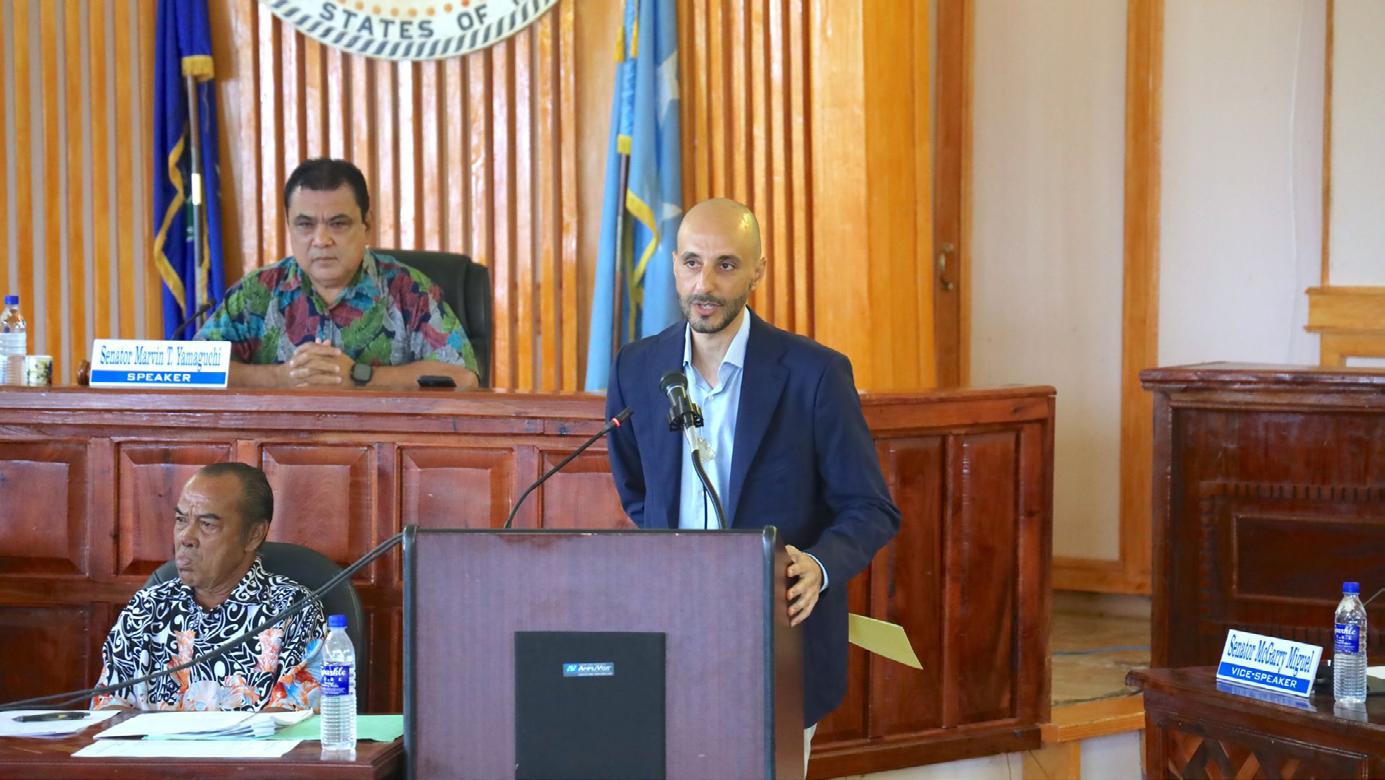
facilities and the restoration of farmlands. It highlights IOM’s efforts to mobilize and train local communities, building long-term resilience through a “build back better” approach.
In addition, lawmakers commended IOM’s role in responding to the 2023 drought, which severely affected low-lying islands across FSM, the Republic of the Marshall Islands (RMI), and the Republic of Palau. IOM reached more than 7,000 people with clean water and hygiene supplies across ten outer islands.
Since launching operations in the region in 2009, IOM has supported the development of early warning systems, evacuation plans, community-based disaster risk reduction and emergency shelter programming. Its work is guided by a rights-based approach that ensures assistance is inclusive, timely, and locally driven.
Many of the islands supported by IOM are geographically isolated and face unique logistical challenges during emergencies. In these places,
IOM has been a critical partner in ensuring that disaster response is coordinated, equitable, and responsive to the needs of each community.
Community engagement has been central to IOM’s approach. Women, youth, traditional leaders and persons with disabilities have helped shape preparedness efforts to ensure they reflect diverse realities and local knowledge. These voices have strengthened disaster governance and ensured that solutions are sustainable and relevant.
The resolution from the Pohnpei State Legislature comes at a pivotal time. Climate change is intensifying the risks facing Pacific Island nations, making coordinated preparedness and adaptation more urgent than ever. IOM’s work continues to evolve in response to these realities, with an emphasis on strengthening local capacities and reinforcing inclusive disaster management systems. These efforts help ensure that populations can move safely when needed, and that those who stay are not left without support.
For more information, please visit IOM’s Media Centre.
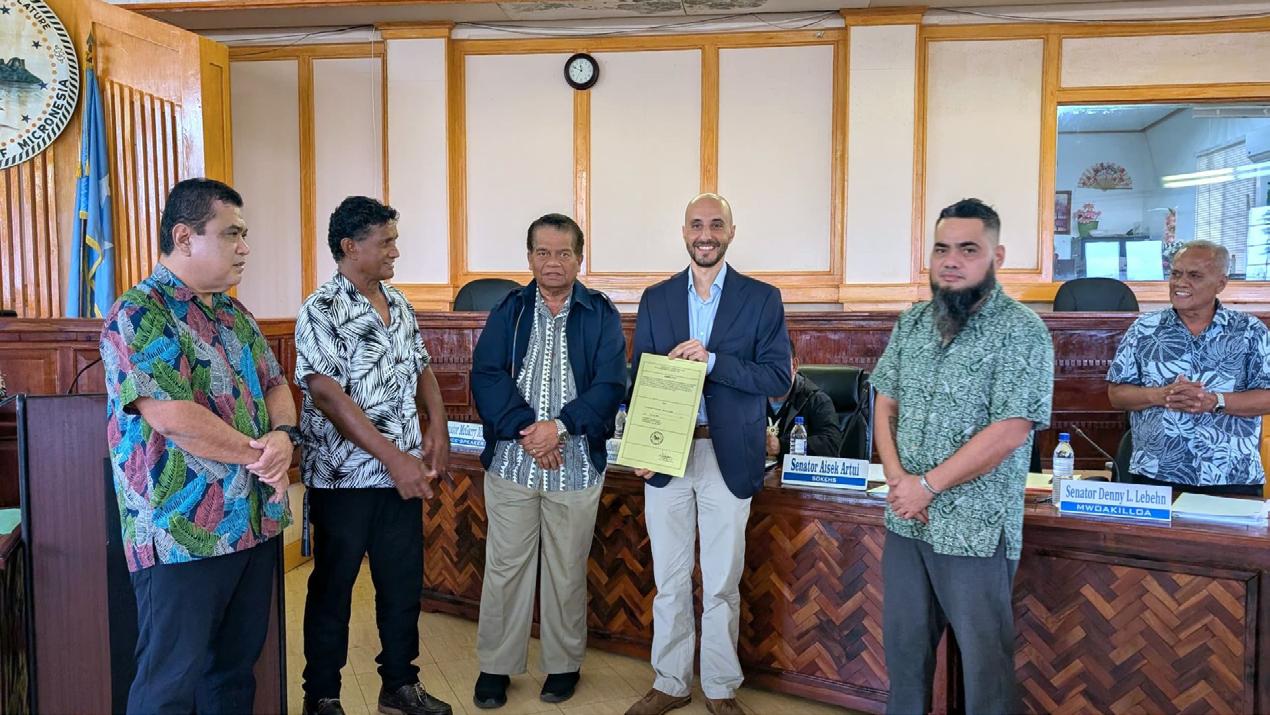

FSM Department of Health and Social Affairs
July 18, 2025
FSM—Public Health workers including health assistants in Pohnpei and Chuuk States are gaining new skills to better connect with families and improve immunization coverage, thanks to a series of Interpersonal Communication (IPC) Skills workshops organized by the
The workshops highlighted that the main goal of IPC in immunization is to ensure children receive their vaccinations on schedule by fostering respectful, trust-based relationships between frontline health workers (FLWs) and caregivers. Participants learned how to tailor their communication to caregivers’ beliefs, knowledge levels, and concerns—especially in communities where cultural, religious, or political influences may affect vaccine acceptance.
“This training gave me the confidence to talk to caregivers in a more respectful and effective way,” said one participant. “I now understand how empathy can change conversations.”

FSM National Department of Health and Social Affairs in collaboration with the Pohnpei and Chuuk State Departments of Health, with technical support from UNICEF and the FSM National Immunization Program Manager, Mr. Carter Apaisam.
The most recent workshop, held in Chuuk State from July 8 - 9, brought together nurses, immunization officers and health assistants for two days of hands-on and interactive training. The sessions were facilitated by Pius Attandoh, UNICEF Social Behavior Change Specialist, and focused on active listening, empathetic engagement, and respectful communication to help address vaccine hesitancy and improve caregiver trust.
Earlier this year, a similar IPC workshop was conducted in Pohnpei State for 15 health and public health workers. Both workshops were graced by the presence of the Chiefs of Public Health, Mr. Semenson Ehpel (Pohnpei State) and Dr. Dorina Fred (Chuuk State)- who emphasized the importance of strong communication in delivering quality health services and increasing vaccine uptake.
The sessions also emphasized the importance of adapting communication strategies depending on whether a caregiver is bringing a child for the first dose or for follow-up vaccinations. While vaccine hesitancy and access issues often affect the former, the quality of service and communication plays a greater role in ensuring return visits.
“I used to struggle with how to respond to vaccinehesitant parents,” shared another attendee. “After this training, I feel prepared and ready to engage them with facts and compassion.”
Interactive role-plays, videos, and group discussions helped participants reflect on how tone, body language, and cultural sensitivity can influence caregiver decisions.
“The role-plays and videos really opened my eyes. I now realize how much my tone and body language affect communication with caregivers,” said one health worker.
“I am so excited about the new IPC techniques we learned, especially how to build trust and listen better,” added another. “I can’t wait to apply them in my outreach work.”
With strengthened IPC skills, Pohnpei and Chuuk frontline health workers are now better equipped to reduce vaccine hesitancy, improve caregiver experiences, and ensure more children complete their vaccination schedules, contributing to healthier communities across the nation.
The next stop is Yap and
States.


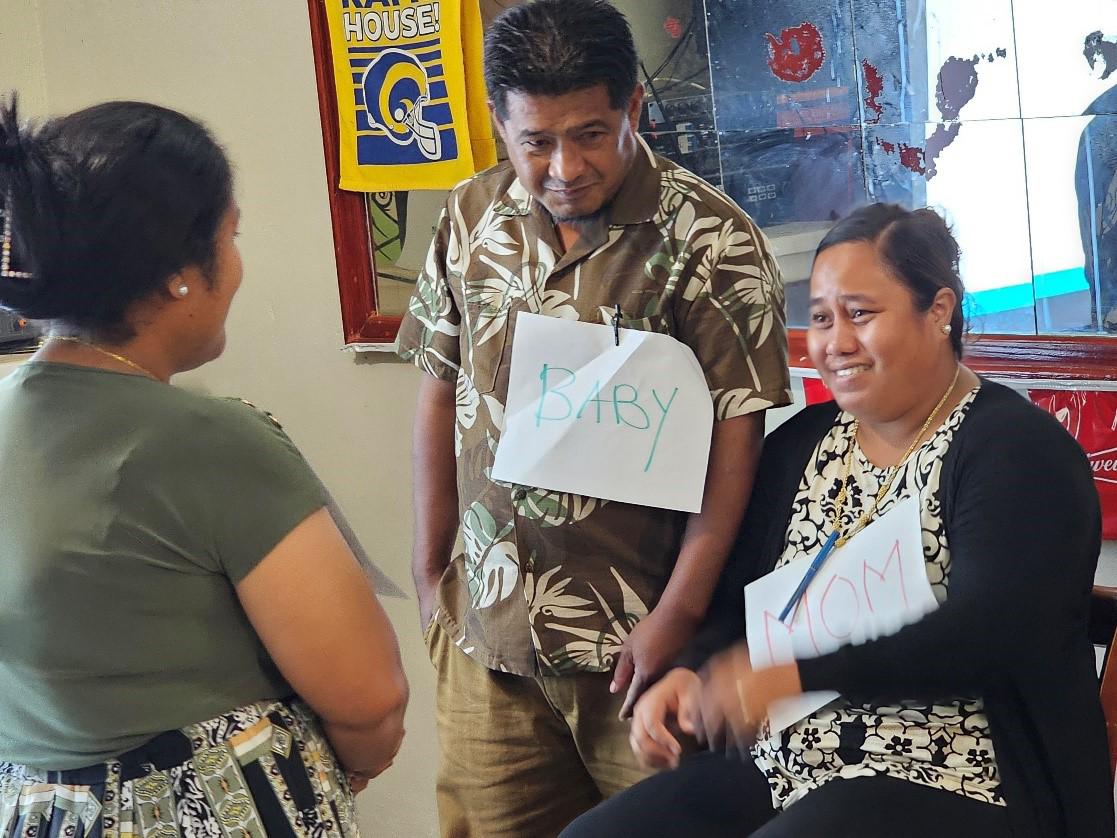

By Bill Jaynes
The Kaselehlie Press
July 26, 2025
Pohnpei—Beautiful, sunny days are great for relaxing on the ocean, having a swim, or just lounging around with a beverage in hand. They aren’t always the best days for productive fishing, and that seemed to be the case for the annual LP Gas Trolling Tournament of the Pohnpei Fishing Club today. But persistent anglers persevered just the same, even though the fish were few and small. Some of them won huge money for their efforts.
Sponsored by Pohnpei LP Gas, En’s Seven Stars, and Seven Stars Inn, anglers trolled for big prize money for the biggest fish of the day. But the biggest fish of the day was only 22.2 pounds, caught by Shalaine Musrasrik, winning her a whopping $1,000—just over $45 per pound of fish.
The rest of the biggest fish of the day were all skipjack tunas. Tony Samuel won second place and $700. Not surprisingly, Dave Spencer’s fish was also among the top prize winners, with a 20.8-pound skipjack earning the $500 third-place prize. Ioakim Mikel caught several skippies, two of which took fourth and fifth prizes in the biggest fish category. One, a 20.2-pound skipjack, won him $350. The other, a 19.8-pound fish, earned him $200 for fifth place.
Though other species were caught, the tournament rules specified that only skipjack, yellowfin, mahi mahi, and wahoo were counted for the biggest-ofspecies prizes. In that category, anglers could win $150 for first prize and $100 for second prize.
Randy Helgenberger had the largest yellowfin tuna that didn’t place in the biggest fish category. His fish weighed 12 pounds. It was followed by a 6.6-pound skipjack caught by Daunte Peterson.
In this category, the biggest skipjack— at 19.6 pounds—was again caught by Ioakim Mikel, who also tied for second place, splitting that prize with Tony Samuel. They each had 19.4-pound skippies.
Only one mahi mahi was landed. Trishia






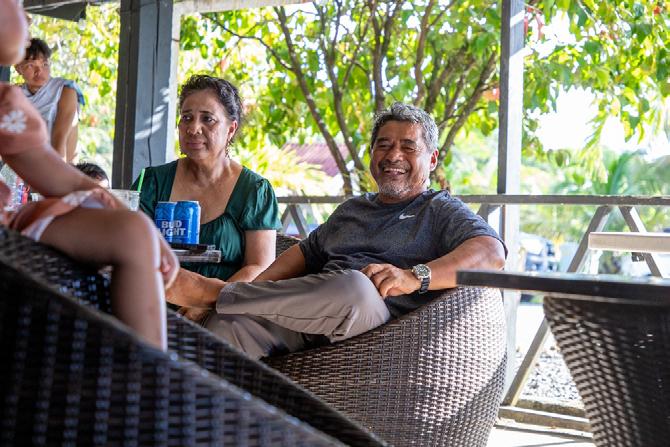
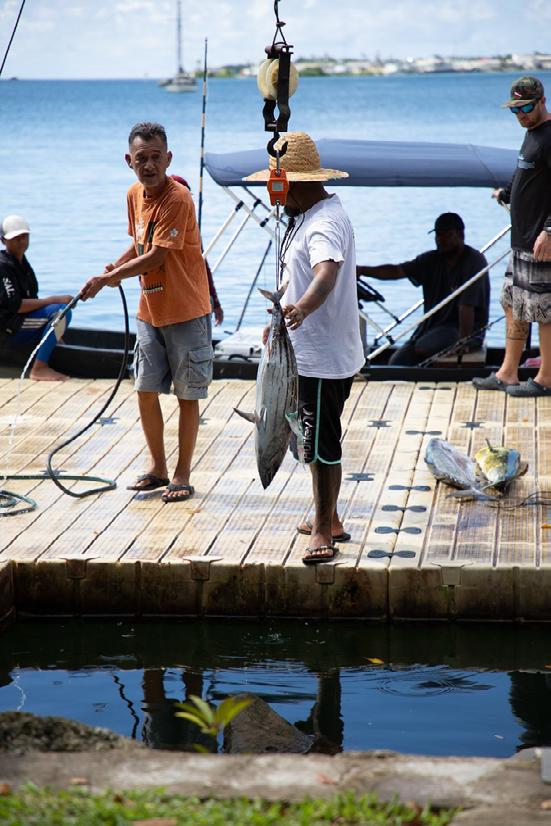


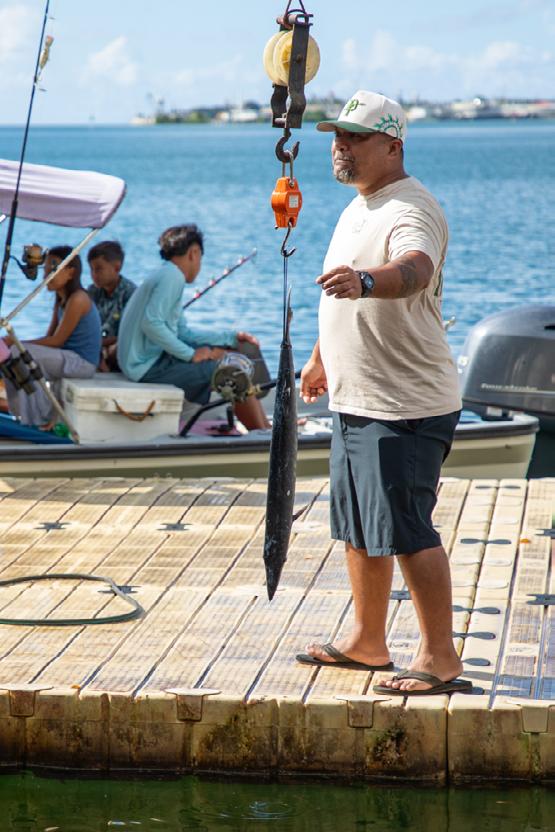


The Forum (PIF) is an Employer of Choice in the region, aiming to recruit and employ staff based on merit and organisational needs, and ensures that employment selection upholds its values and commitment to Forum membership, gender balance and building a diverse and inclusive organisation. PIFS is committed to achieving gender balance and being fully representative of our member countries. Our workforce is currently over 50% female, and we have representatives from twelve of the eighteen Forum member countries.
To achieve greater workforce representation from our member countries we strongly encourage applicants from the following countries to apply: Federated States of Micronesia, French Polynesia, Nauru, Niue, New Caledonia, and Palau.
The Programme Adviser – Private Sector and Labour Mobility role will provide high level analysis and policy advice on the various regionalism priorities, as determined through the Pacific Islands Forum decision making processes, and in support of the 2050 Strategy for the Blue Pacific Continent Implementation Plan (2050 IP). The key responsibilities are summarised as:
• Research & Development
• Technical Advice and Support
• Build strong relationships through Officials-level liaison with Forum Member Countries and other counterparts
• Team Performance & Leadership
Applicants should have an advanced degree (preferably Master level or equivalent) in Development Economics, Trade, Private Sector, Labour, Economics, Governance, International Relations, or a related discipline; with at least eight (8) years of experience with economic policy development, trade and private sector development, labour, and programming and analysis capacity building, especially at the government level.
Candidates with knowledge and understanding of economics, trade, the private sector, labour mobility, and governance, pertaining to Forum Member States, in relation to international and regional economic and trade integration, economic governance, and reform issues, are encouraged to apply.
The position carries a competitive and attractive remuneration and benefits package including medical and life insurance, education, and housing allowance. The position is placed at Band 12 / Adviser level of our salary scale, starting at SDR 45,113 equivalent to FJD 135,800.
Note: Amounts are based on 1 January foreign exchange rates, but the final salary will be dependent on foreign exchange rates at the time of payment.
Interested applicants can find out more information on the PIFS website: www.forumsec.org where an information package containing the full responsibilities, selection criteria, and remuneration details, is available.
Candidates must include in either their application or Curriculum Vitae the full contact details of three referees. For non- Fijian nationals, this salary may be tax-free. To be eligible for this position, the applicant must be a national of a Forum member country*. Applicant must be willing to travel periodically via economy class.
(Those already applied need not to reapply your applications will be considered in the final process after readvertisement) The deadline for applications is Friday 15 August 2025.
*Member States of the Pacific Islands Forum: Australia, Cook Islands, the Federated States of Micronesia, Fiji, French Polynesia, Kiribati, Nauru, New Caledonia, New Zealand, Niue, Palau, Papua New Guinea, the Republic of the Marshall Islands, Samoa, the Solomon Islands, Tonga, Tuvalu, and Vanuatu.

Habele
July 18, 2025
Colonia, Yap—In a quiet yet determined effort to expand educational opportunities in the Western Pacific, an American nonprofit is helping students from some of Micronesia’s most remote islands access the region’s top-performing private schools. At the same time, decades long US-Micronesia ties are being strengthened.
Habele, a U.S.-based charity founded by former Peace Corps Volunteers, has awarded more than 150 scholarships for the 2025–26 school year to students across the Federated States of Micronesia (FSM). Covering 75 percent of tuition costs, these scholarships help low- and middle-income students attend independent elementary and high schools in three of the FSM’s four states.
The initiative addresses a critical gap. While the Compact of Free Association allows Micronesian students to attend U.S. colleges with federal financial aid, many— especially those from outer islands and single-parent or single-earner households—lack access to the kind of rigorous K–12 education needed to succeed in higher education.
“Habele did more than support my education; they believed in my potential,” said Sheridan Giltamag, a former scholarship recipient and now a sophomore at Eastern Oregon University, where she maintains a 3.9 GPA and co-chairs a student leadership group. Four years of Habele tuition assistance allowed her to enrolled and graduate from Our Lady of Mercy, the top performing high school on the Island of Pohnpei. “Their belief in students like me inspired my dream to one day start my own nonprofit and give back to my community, just as they have for me.”
This year’s scholarship recipients reflect the diversity and challenges faced across the FSM, a scattered collection of islands home to more than five unique languages and
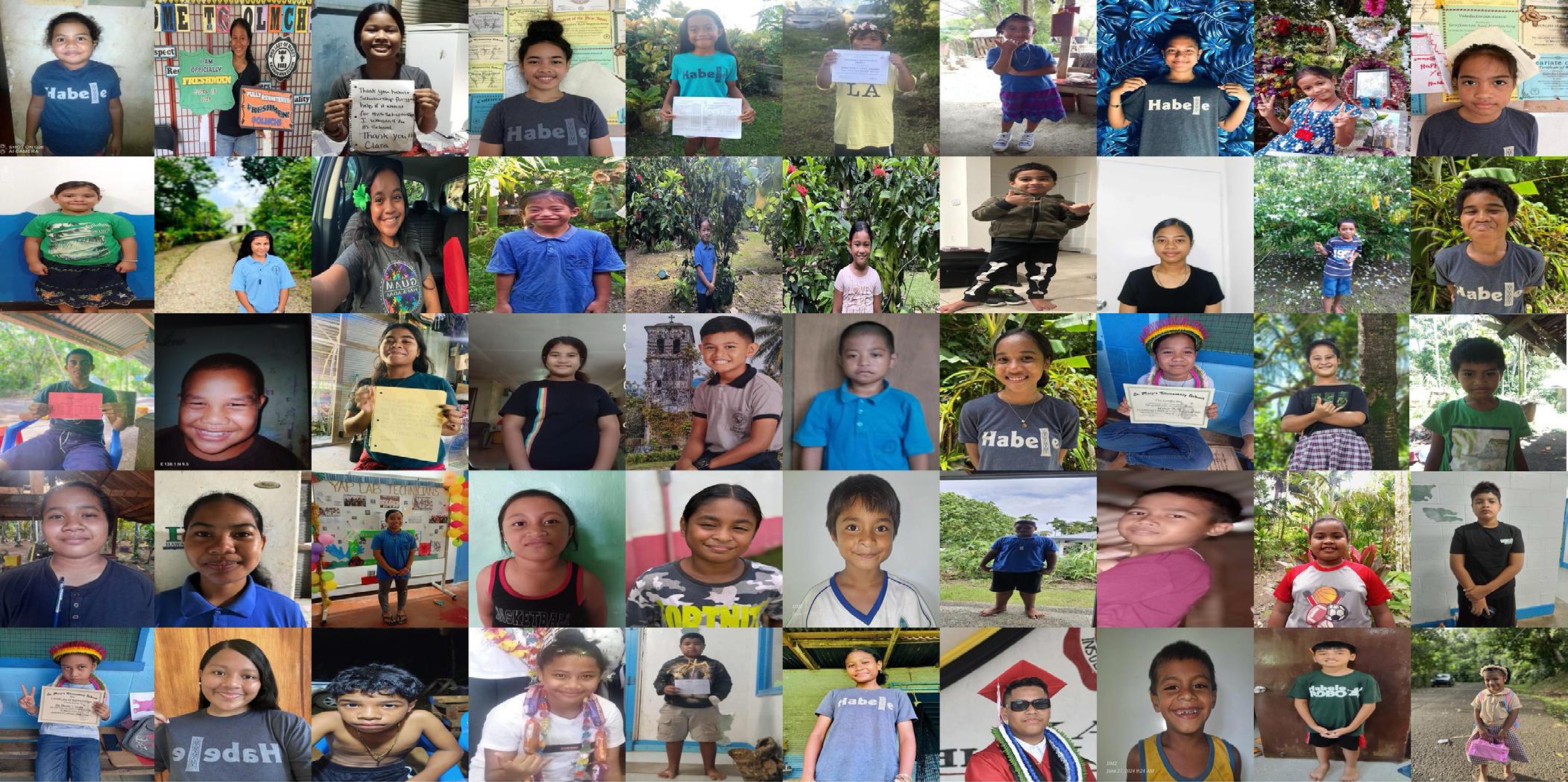
distinct cultures. Among the scholars are 18 students raised by adoptive or step-parents, 21 from singleparent homes, and eight who applied independently on their own initiative. Nearly half have siblings or cousins who also receive scholarships, with all maintaining GPAs above 3.5.
Habele’s approach is unique. The FSM, a nation of 100,000 people, is set to receive more than $52 million for education in 2025 from the U.S. Government through annual Compact Sector Grants. Additional funding comes from the U.S. Department of Education, which treats FSM state departments of education as local school districts, making them eligible for a wide range of federal programs and grants. By contrast, Habele’s scholarships are entirely funded by the private donations of individual Americans who give annually to the charity so bright, ambitious students can attend the higher performing independent school of their parents’ choosing. The program is operated by Habele’s sole full-time employee.
The majority of scholarship recipients—81 students—come from the remote Outer Islands of Yap and Chuuk, where educational options are most limited. Others hail from Yap Proper (36), Pohnpei (16), Chuuk Lagoon (14), with smaller numbers from the Outer Islands of Pohnpei (2) and Kosrae (1).
This year’s cohort includes 92 girls and
58 boys, spanning grades one through twelve. They attend 13 independent schools, including highly regarded institutions such as Yap Catholic High School, Xavier High School in Chuuk, and Our Lady of Mercy Catholic High School in Pohnpei. Among the 122 returning students who received renewal scholarships, the average student has received tuition support for more than three years.
“Habele is a great example of how to build the people-to-people connections that are the foundation of ties between the United States and the diverse islands of Micronesia,” said Grant Newsham, a retired U.S. Marine officer, former diplomat, and business executive with extensive experience in the Asia-Pacific region, on a recent trip to Yap. “Even more, Habele sets a standard that other parts of the US Government and development agencies should emulate. It’s amazing. A small, locally engaged nonprofit, dependent on private donations, and with minimal overhead, is achieving measurable results down to the local village level, where its efforts are highly valued. That tells you everything.”
“Habele’s nimble, efficient operations reaching all parts of the FSM contrast with the ponderous, siloed, and often geographically limited efforts of the U.S. government – even if well intentioned. “
“Speaking as a former diplomat and military officer with experience in
development operations,” Newsham continued, “we need Habele doing more of what it does. Pound-for-pound I’d say it’s one of the most effective efforts of its kind – anywhere on earth.”
“And Habele’s work is even more valuable as we are at a time when malevolent third-party nations are actively working to win hearts and minds and undermine the Compact.”
Since awarding its first scholarship in 2006, Habele has supported more than 300 students. But demand remains high: over 225 students submitted on-time applications this year, highlighting the unmet need in these island communities ahead of the June 30 deadline. Late applications continue to come in.
In households where this year’s scholarship recipients live, an average of 7.6 people share a home, with only 1.4 wage earners per household. The scholarships ease financial burdens while preserving families’ ownership and responsibility for their children’s success.
In May, eleven Habele scholars graduated from high school, headed off to four-year colleges on Guam, Hawaii and the US mainland. For these young islanders, the journey from remote atolls to college campuses thousands of miles away often begins with one simple but transformative act: someone believing in their potential.


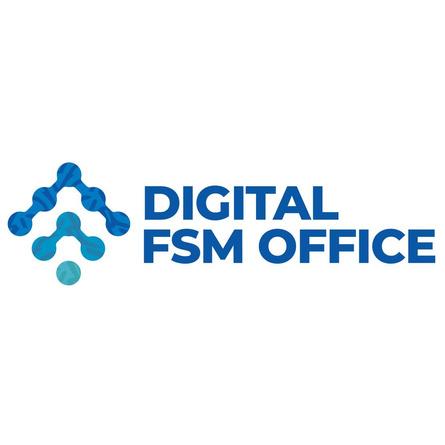



Alliance of Small Island States
July 23, 2025
The Hague—The Alliance of Small Island States (AOSIS) welcomes today’s historic Advisory Opinion from the International Court of Justice (ICJ) — a global affirmation that climate harm is not just unjust, it is unlawful.
This ruling is a testament to what small states can achieve through principled diplomacy, collective advocacy, and legal innovation. In 2019, 27 Pacific law students at the University of the South Pacific in Vanuatu planted the seed of an idea: that the world’s highest court could help protect the rights of nations most exposed to the climate crisis. That idea became a movement — led by youth, championed by Vanuatu, and supported by civil society, legal experts, and the solidarity of Small Island Developing States (SIDS).
In 2023, over 130 countries co-sponsored a UN General Assembly resolution calling on the ICJ to clarify States’ legal duties on climate change. Today, that initiative comes full circle — delivering a ruling that recognizes and reinforces key principles that AOSIS and our members have long upheld.
“This opinion reflects the strength of collective advocacy and the hope that has driven this initiative from the very beginning. It is the result of sustained advocacy by Pacific youth, legal experts from vulnerable nations, and States that chose not to remain silent. The ICJ’s findings demonstrate that moral clarity and legal authority can reinforce one another. This ruling must serve as a foundation — not a conclusion. We now call on all States to act with renewed urgency and ambition, in accordance with their legal obligations and the demands of justice.”
— Ambassador Ilana Victorya Seid, Chair of AOSIS and Permanent Representative of Palau to the United Nations
Key legal findings welcomed by AOSIS
1. A binding 1.5°C obligation:
The Court affirmed that the 1.5°C target is not merely a political aspiration — it is a legally binding obligation, based on the Paris Agreement and subsequent decisions of its governing bodies. This is a revolutionary development. For SIDS, holding the line at 1.5°C is essential for continued viability.
2. The duty to cooperate:
The Court reaffirmed that States have a
customary legal obligation to cooperate in addressing climate change. Voluntary action is not enough. Climate justice demands coordinated, sustained, and legally mandated cooperation across borders.
3. Maritime rights and sea-level rise:
AOSIS strongly supports the Court’s affirmation that sea-level rise cannot invalidate existing maritime baselines and entitlements. This provides long-awaited legal certainty to island nations whose territorial integrity is threatened by rising seas.
4. Continuity of statehood:
The Court’s opinion upholds the principle that States do not lose their legal identity or rights due to climate-induced territorial loss. This aligns with AOSIS’s longstanding position that sovereignty endures — and must be preserved — even amidst profound physical changes.
5. Submission of NDCs representing parties’ highest possible ambition AOSIS has continuously called for the submission of enhanced, highly ambitious NDCs by September 2025, and the AO delineates that “each party must do its utmost to ensure that the NDCS it puts forward represents its highest possible ambition in order to realize the objectives of the agreement”. Furthermore, we welcome the decision that the standard of NDCs assessment will vary depending on historical GHG emissions, and level of development and national circumstances.
A new chapter in international law
Small Island Developing States are often called the moral voice of the climate movement. Today, we have demonstrated that our role is also legal, strategic, and enduring. The international legal system can be complex — but SIDS have shown how to navigate it with vision, determination, and skill.
This opinion is not the end of the road. It must now inform action across every level — including negotiations under the UNFCCC and Paris Agreement, implementation of national climate policies, and interpretation of rights and obligations in courts around the world.
In an increasingly unstable world, international law offers what SIDS need most: certainty, predictability, and resilience. We will carry this ruling into every negotiation, every courtroom, and every call for justice. For small islands, this is not just about climate — it is about our future. And we will never stop defending it.
Notice is hereby given that our client, PayPal, Inc., a company organized and existing under the laws of Delaware and with a principal place of business at 2211 North First Street, San Jose, California 95131, United States of America, is the owner and sole proprietor of the following trademark in Micronesia:

Which is used in connection with the following:
Class Goods
9 Downloadable software for processing electronic payments and for transferring funds to and from others; downloadable software for facilitating money transfer services, electronic funds transfer services, bill payment remittance services, electronic processing and transmission of payments and payment data; downloadable computer software and downloadable mobile application software for facilitating electronic commerce transactions; downloadable software for use as a digital wallet; downloadable software for connecting digital wallets; downloadable software for connecting, integrating, and enabling transfer of funds between digital wallets and financial accounts; downloadable software for linking independent financial accounts and digital wallets, enabling migration of data and transfers of funds between independent third party financial accounts and digital wallets, and establishing secure connections between independent financial accounts and digital wallets; downloadable computer software for use for financial account management, namely, software for managing and facilitating financial transactions and funds transfers for bank accounts, credit card accounts, debit card accounts, and digital wallets; downloadable authentication software for controlling access to and communications with computers and computer networks; downloadable software for currency conversion.
35 Providing business information regarding money transfer services; business consulting services in the field of online payments; business managing and tracking credit card, debit card, ACH, prepaid cards, payment cards, and other forms of payment transactions via electronic communications networks for business purposes; business information management, namely, electronic reporting of business analytics relating to payment processing, authentication, tracking, and invoicing.
36 Electronic payment services involving electronic processing and subsequent transmission of bill payment data; Payment transaction processing services; providing electronic processing of electronic funds transfer, ACH, credit card, debit card, electronic check and electronic payments; financial information processing; money transfer services; electronic funds transfer services; bill payment services; providing a payment network for facilitating transactions from digital wallets; providing financial services, namely, bill payment services provided via a digital wallet and providing secure commercial transactions; transaction processing services for bank accounts, debit cards, and credit cards on embedded digital wallets, cross-border money transfers to banks and mobile wallets with real time currency exchange rates; clearing financial transactions via a global computer network and wireless networks; credit card and debit card transaction processing services; processing of electronic wallet payments; currency exchange services; electronic commerce payment services, namely, establishing funded accounts used to facilitate transactions and purchases on the internet.
42 Providing temporary use of online non-downloadable software for processing electronic payments and for transferring funds to and from others; Application Service Provider (ASP) featuring Application Programming Interface (API) software for facilitating payment transactions and financial information processing; providing temporary use of online non-downloadable software for facilitating money transfer services, electronic funds transfer services, bill payment remittance services, electronic processing and transmission of payments and payment data; providing temporary use of online non-downloadable software for facilitating electronic commerce transactions; providing temporary use of online non-downloadable software for use as a digital wallet; providing temporary use of online non-downloadable software for connecting digital wallets; providing temporary use of online nondownloadable software for connecting, integrating, and enabling transfer of funds between digital wallets and financial accounts; providing temporary use of online non-downloadable software for linking independent financial accounts and digital wallets, enabling migration of data and transfers of funds between independent third party financial accounts and digital wallets, and establishing secure connections between independent financial accounts and digital wallets; providing temporary use of online non-downloadable software for use for financial account management, namely, software for managing and facilitating financial transactions and funds transfers for bank accounts, credit card accounts, debit card accounts, and digital wallets; providing temporary use of online non-downloadable authentication software for controlling access to and communications with computers and computer networks; providing temporary use of online non-downloadable software for currency conversion.
Please take notice that PayPal, Inc., a company organized and existing under the laws of Delaware and with a principal place of business at 2211 North First Street, San Jose, California 95131, United States of America attaches singular importance to its above referenced trademark and will immediately take the strongest legal actions to protect its intellectual property rights against any person(s) or business(es) found to be infringing those rights in Micronesia. Note that any infringing or unauthorized use of this mark will be met with civil and criminal action including injunctions, orders to seize, audits, full damages and costs.
Any inquiry regarding said trademark may be referred to the attorneys for PayPal, Inc. as follows: Hilborne, Hawkin & Co. 2102 Business Center Dr, #2003 Irvine, California 92612
United States of America Telephone: (714) 283-1155
Facsimile: (714) 283-1555
Email: info@hilbornehawkin.com
Pohnpei Public Information
July 24, 2025
Pohnpei—Governor Stevenson A. Joseph and Lieutenant Governor Herolyn S. Movick held their first official meeting this week with the Director of the Department of Health and Social Services (DHSS), with discussions centered around key health-related issues.
While the meeting marked their first joint engagement with a department head, the focus happened to be on health matters, including medical referrals, health insurance, health policy, and administrative priorities. The team also reviewed upcoming health initiatives, which will be shared with the public as they develop.
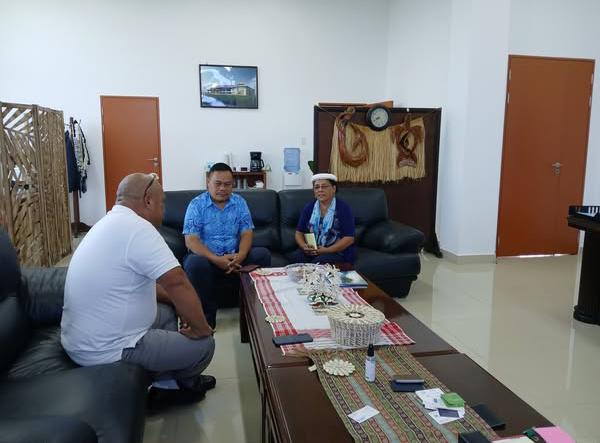
Lieutenant Governor Movick provided valuable input throughout the discussion, helping shape a shared vision for effective leadership and collaboration.
This productive first meeting set a positive tone for the Joseph/Movick Administration and laid the groundwork for a unified approach to addressing state priorities moving forward.
By Bill Jaynes
The Kaselehlie Press
July 16, 2025
Pohnpei—Governor Stevenson
A. Joseph has officially declared July 26, 2025, as the “International Day for the Conservation of the Mangrove Ecosystem in Pohnpei State,” aligning with the United Nations-designated observance of the same name.
In Executive Proclamation No. 25-04, issued on July 15, Governor Joseph emphasized the vital role mangrove ecosystems play in supporting biodiversity, providing coastal protection, and helping mitigate climate change through carbon sequestration. He also highlighted the cultural and ecological significance of Pohnpei’s mangrove forests, which offer food security, traditional resources, and economic benefits to island communities.
“Mangroves are not only critical buffers against storms and erosion but
also nurseries for marine life and a living symbol of our heritage and resilience,” the Governor said in the proclamation.
The Governor acknowledged ongoing efforts by the Pohnpei State Government, including collaboration with the Department of Environment, Climate Change and Emergency Management (DECEM), the Conservation Society of Pohnpei, and various local and international partners in the protection and restoration of mangrove ecosystems.
He called on municipal governments, schools, youth groups, traditional leaders, non-governmental organizations, and citizens across Pohnpei to participate in educational and conservation activities on July 26. These may include community clean-ups, tree planting, public awareness campaigns, and cultural events that honor the value of mangroves.
“Let this day be a reminder of the shared responsibility to care for the land and sea that sustains us,” Governor Joseph said, encouraging collective stewardship “rooted in both traditional knowledge and modern science.”


By The Global Filipino Magazine, adapted by The Kaselehlie Press
July 25, 2025
Manila—The Philippines and the Federated States of Micronesia (FSM) have signed a joint declaration of intent (JDI) to enhance labor protections and employment opportunities for overseas Filipino workers (OFWs) in Micronesia, the Philippine Department of Migrant Workers (DMW) announced on July 21.
The Global Filipino Magazine reported that the agreement is a major step toward promoting fair, ethical, and sustainable employment for Filipino workers, ensuring they receive the same benefits and social protections as local employees in FSM.
Signed by DMW Secretary Hans Leo Cacdac and FSM Secretary of Justice and Attorney General Leonito
Bacalando Jr., the JDI paves the way for increased deployment of Filipino workers in critical sectors such as healthcare, education, construction, and services.
“This is a great step forward, the signing,” said Bacalando. “Filipino contributions are valuable to our nation’s development.”
Between 2015 and 2024, nearly 1,900 OFWs have been deployed to FSM, according to DMW records. The new agreement aims to streamline the deployment process through closer coordination with the Technical Education and Skills Development Authority (TESDA), focusing on proper skills certification and effective job matching.
The bilateral deal also strengthens both countries' resolve to combat irregular migration. It includes measures to prevent illegal recruitment, human trafficking, smuggling, and document fraud—ensuring a safer and more transparent employment pathway for Filipino workers.
FSM Public Information Services has not yet released any information on the agreement.
Pohnpei Public Information
July 16, 2025
Pohnpei—On July 14, 2025, the Governor of Pohnpei, Honorable Stevenson A. Joseph, welcomed the newly appointed Postmaster General, Ehpel Ilon, along with staff members Juliet Jimmy and Wayne Artui, during a recent visit to discuss postal operations. The Governor and Postmaster General expressed mutual respect and gratitude for the opportunity to strengthen collaboration in serving the people of Pohnpei.
During the meeting, Governor Joseph raised concerns received from the public regarding the handling and delivery of mail. In response, Postmaster General Ilon and staff outlined the postal
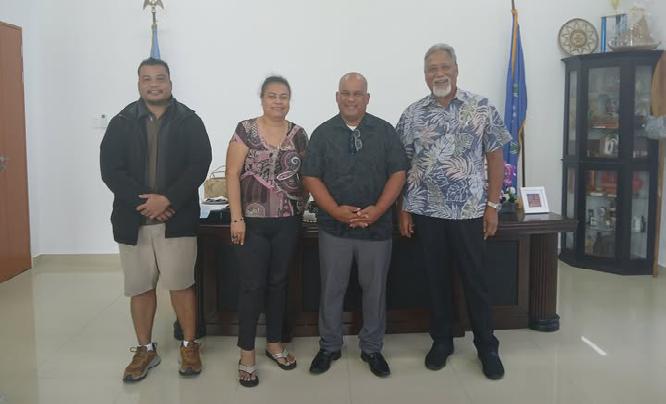
service’s mail handling procedures, emphasizing safeguards designed to ensure proper and timely delivery. They also encouraged residents to report any discrepancies to help improve service reliability.
The Pohnpei State Government remains committed to working with the postal service to address community concerns and enhance the efficiency of mail delivery for all residents.

Pohnpei Public Information
July 21, 2025
Kahmar, Nett, Pohnpei—On
Wednesday, July 16, 2025, Governor Stevenson A. Joseph joined dignitaries, traditional leaders, and project partners for the official groundbreaking ceremony of the Pohnpei Primary Healthcare Facility, a major new project that will enhance access to primary healthcare services for the people of Pohnpei. The facility will be built adjacent to the Pohnpei State Hospital in Nett.
Dignitaries delivering remarks at the event included Her Excellency Jennifer L. Johnson, United States Ambassador to the Federated States of Micronesia; His Royal Majesty Pwoud Lepen Nett, Nahnmwarki of Nett; Mr. David Hawkins, Acting Manager of the Pohnpei Project Management Office; and Mr. Robert Goodwin, who spoke on behalf of the Honorable Carlson D. Apis, Secretary of the FSM Department of Transportation, Communication and Infrastructure (DT&CI).
Governor Joseph expressed deep appreciation to the United States Government for its steadfast support and collaboration in advancing

health infrastructure in the FSM and in Pohnpei. He noted that this project, years in the making, faced delays due to a combination of factors—some external and some internal—but that its realization demonstrates the strength of cooperation and perseverance.
The Governor emphasized that the experience surrounding this project highlights the need to learn from past challenges and streamline government processes. He referenced two executive
Pohnpei Public Information
July 23, 2025
Pohnpei—Governor Stevenson A. Joseph received a courtesy visit from Mr. Stalin Pedro of the Republic of Palau, a representative of the Micronesian Shipping Commission (MSC), last week.
Mr. Pedro provided Governor Joseph with an update on the MSC’s current initiatives and its critical role in enhancing maritime transportation services across the region. The MSC is a treaty-based regional body comprised of the Federated States of Micronesia, the Republic of Palau, and the Republic of the Marshall Islands. Its primary responsibilities include coordinating shipping routes, negotiating shipping service agreements, promoting reliable and affordable sea transport, and ensuring equitable access to maritime services for all member countries.

orders he issued with the goal of ensuring that projects—whether funded from within or outside the state—are thoroughly prepared, reviewed, and coordinated before moving to the implementation stage.
He noted that many delays stem not from the process itself but from how individuals choose to engage with it, cautioning against personalizing or politicizing routine procedures. This behavior, he said, undermines progress and stalls important public projects.
Governor Joseph also stressed the importance of the new facility in improving public health outcomes, stating that it will support preventive care efforts and help address the growing
challenge of non-communicable diseases (NCDs) in Pohnpei.
He called on leaders and agencies to maintain objectivity, follow procedures responsibly, and, where necessary, recommend meaningful changes. His administration has already proposed several improvements aimed at promoting transparency, accountability, and timely project delivery.
The Pohnpei Primary Healthcare Facility will play a critical role in delivering quality primary care services across the island and stands as a powerful symbol of what can be achieved through partnership, leadership, and a shared commitment to public health.
The courtesy visit followed the recent 27th Micronesian Islands Forum held in Majuro, where Governor Joseph, in his opening remarks, highlighted the importance of regional mechanisms such as the MSC and ATOSSCOM— the Association of Terminal Operators, Stevedoring, and Shipping Companies of Micronesia. He underscored the need for deeper collaboration to address the unique shipping and transportation challenges faced by island nations, including high costs, limited port access, and irregular service schedules.
Governor Joseph expressed appreciation for the visit and emphasized the importance of strengthening cooperation with both the MSC and ATOSSCOM to support more efficient port operations, better shipping connectivity, and greater resilience in regional supply chains.


FSM Department of Transportation, Communications & Infrastructure
July 23, 2025
Palikir, Pohnpei—From June 23 to July 4, 2025, the Digital FSM Office (DFO), in partnership with Accenture, successfully delivered a two-week training program focused on Microsoft 365 tools and change management for public sector personnel. This initiative is part of the broader World Bank–funded Digital FSM Project, which aims to build digital capacity across all four states of the Federated States of Micronesia (FSM).
More than 60 participants from key government agencies—including the Office of the President, Department of Justice, Department of Foreign Affairs, Department of Transportation, Communications & Infrastructure, Police, and Department of Resources & Development—took part in hands-on sessions covering Outlook, Calendar, Microsoft Teams, and SharePoint.
The training sessions were designed not just to introduce tools, but to support a cultural shift in how government staff approach their daily work. As trainers emphasized, Microsoft 365 is not simply a technical upgrade—it represents a new way of working: more collaborative, more transparent, and better aligned with the demands of a
modern public service.
“This training was informative and very helpful. We recently transitioned from Gmail to Outlook, and this workshop made the change much smoother,” said Dominic Burg, Aviation Security Inspector for DTC&I. “The tools are more integrated—Outlook, SharePoint, and Word—and it’s made it easier to collaborate across departments. I really hope the national government extends this training to the states, especially for those of us working with counterparts who also need to understand how to use these tools effectively.”
Designed with practical application in mind, the training equipped participants with essential digital tools to enhance productivity, facilitate cross-agency collaboration, and improve service delivery efficiency. The sessions also helped introduce modern project planning and file-sharing practices that will be critical as government departments transition to more integrated, cloud-based operations.
“I used Outlook before just for emails and receipts, but this training showed me how all the Microsoft 365 tools connect—especially Teams, which is a game changer for us. In the President’s Office, schedules change at the last minute, and now we can update departments instantly without
running around or making phone calls. Everything is synchronized, and I finally feel ready to use these tools confidently,” said Hainrick Isaac, the Administrative Officer for the President’s Office.
Another attendee, from the President’s Office, mentioned, “Using SharePoint significantly transforms how you manage and collaborate. We used to walk around with papers and manually post sign-up sheets. Now we can share documents instantly and keep our team updated without leaving the office. It’s more professional and secure than what we used before. I’m confident using it and look forward to helping my colleagues learn too.”
All attendees are provided with training materials and templates and are encouraged to bring a laptop. The current training series is part of a broader learning program being rolled out by the Digital FSM Office over the coming weeks, with the objective of equipping civil servants with tools and knowledge to support digital service delivery across government.
Facilitators acknowledged that for many staff members—especially those accustomed to working offline—the transition to cloud-based systems will take time. To address this, sessions included practical tips, live
demonstrations, and hands-on exercises to build comfort and confidence in using new tools.
These capacity-building efforts fall under Component 3 of the Digital FSM Project, which supports institutional development and fosters an enabling environment for digital government and the digital economy. The project complements key legislative efforts currently underway, including four new digital laws being considered by Congress.
“This is how we build digital government—not only by investing in infrastructure but also by empowering our people to use it,” said Mr. Rockson Hebel, Communications Officer at the Digital FSM Office. “These trainings are a direct response to the need for better tools, more collaboration, and smarter public service delivery.”
Building on that initial success, the DFO launched two more rounds of Microsoft 365 sessions from July 15th to July 18th, and from July 22nd to July 25th, 2025, with a focus on Microsoft Word. The training—held twice daily at the DTC&I Annex Building and also available virtually via Teams—caters to government staff of all levels, covering both basic and advanced features of Word.
Central Implementation Unit, Department of Finance and Administration
June 24, 2025
Palikir, Pohnpei—The Government of the Federated States of Micronesia (FSM) has entered formal negotiations with the World Bank for an additional US$18.4 million grant under the Digital FSM Project. This additional financing will enhance ongoing efforts to upgrade communications infrastructure, modernize government services, and expand digital access for citizens across all four states.
The Digital FSM Project, launched in 2020 with support from the World Bank, is a national initiative aimed at expanding digital connectivity and enabling inclusive access to digital services across the FSM. The project focuses on promoting and enhancing digital infrastructure, fostering digital government services, and strengthening the legal and regulatory framework necessary for a modern digital economy. Building on prior investments
in submarine fiber optic networks, Digital FSM seeks to bridge the digital divide across FSM’s four states by making digital services more affordable, secure, and accessible. This is a critical step toward enhancing economic growth, improving public service delivery, and ensuring government efficiency in even the most remote communities.
The extra funding will address rising implementation costs, currency fluctuations and support the rollout of new strategic digital initiatives that are critical to FSM’s development agenda. Key areas covered under this expanded support include:
- Completion of the open-access FTTH network is underway. This will provide resilient, high-capacity fiber infrastructure for our long-term needs.
- Secure government network systems, with improvements in email systems, cloud adoption, and shared digital applications
- Expansion of digital public infrastructure, including secure digital identification,
interoperable platforms for online government services, and digital payment systems.
- Process Automation and delivery of Digital Government Services. Additional funding will be used to improve internal Government processes and start the first of many eServices for citizens.
- Cybersecurity and digital legislation support, including support for the implementation of new laws before Congress on cybercrimes, electronic transactions, and data protection
- Disaster recovery planning, ensuring the resilience of digital services during and after climate-related events
- Capacity building and institutional strengthening for the Digital FSM Office and partner institutions
The investment in open-access FTTH enables both competition and the delivery of the fastest technology, resulting in better services and lower prices. Provision for competition saw FSM being among the first in the Pacific to receive Starlink services, enabling high-speed
internet access across every inch of the FSM.
The investment in Digital Services and new laws will make it easier for the National and State Governments to securely transact online. The combination of connectivity everywhere and digital services means that citizens across the FSM will be able to learn, access health support, and interact with the government, regardless of whether they are on the main island or the most remote outer island.
Negotiations were initiated through a formal invitation issued by the World Bank on June 18, 2025, and included representatives from the Department of Finance & Administration, Department of Transportation, Communications & Infrastructure (DTC&I), FSM Telecommunications Cable Corporation, and the Central Implementation Unit (CIU). The discussions will finalize key legal and technical agreements required to process the additional financing, which will extend the project through March 2027.

Pacific Islands Forum Secretariat
July 16, 2025
Suva, Fiji—A series of high-level Ministerial Meetings of the Pacific Islands Forum will begin this month in Suva, bringing together senior officials, government ministers, and leaders from across the region to progress key regional priorities.
Throughout July, Pacific ACP Trade Ministers, Forum Trade Ministers, Forum Economic Ministers, and Pacific Islands Forum Women Leaders will convene, followed by Forum Foreign Ministers who will meet in August. These important discussions will pave the way for the 54th Pacific Islands Forum Leaders Meeting to be held in Honiara, Solomon Islands from 8 to12 September 2025. The theme for the Leader’s meeting is “Iumi Tugeda: Act Now for an Integrated Blue Pacific Continent”.
“As we prepare for the 54th Forum Leaders Meeting in Honiara, our collective focus remains on delivering the regional outcomes that our people expect — grounded in the 2050 Strategy for the Blue Pacific continent and shaped by Pacific priorities,” said the Pacific Islands Forum Secretary General, Baron Waqa.
The Ministerial Meetings will focus on progressing regional cooperation under the 2050 Strategy, including advancing the Pacific Roadmap for Economic Development, a refreshed Pacific Aid-for-Trade Strategy, the revitalised Pacific Leaders Gender Equality Declaration, and ongoing work under the Review of the Regional Architecture.
These meetings are a critical part of ensuring a coordinated and unified approach of the Pacific Islands Forum to shared challenges and opportunities, in line with the vision of a resilient, inclusive, and sustainable Blue Pacific region.
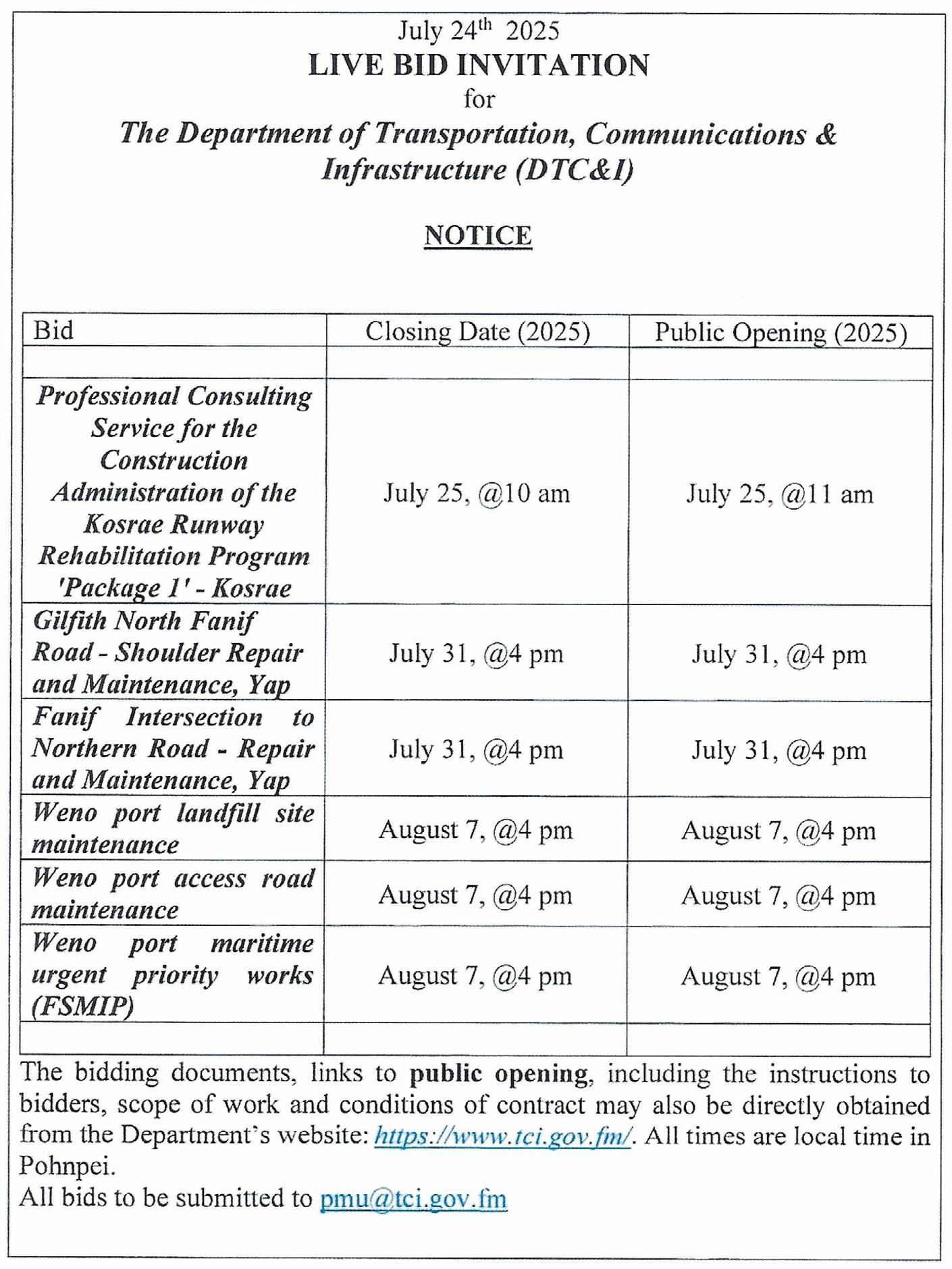
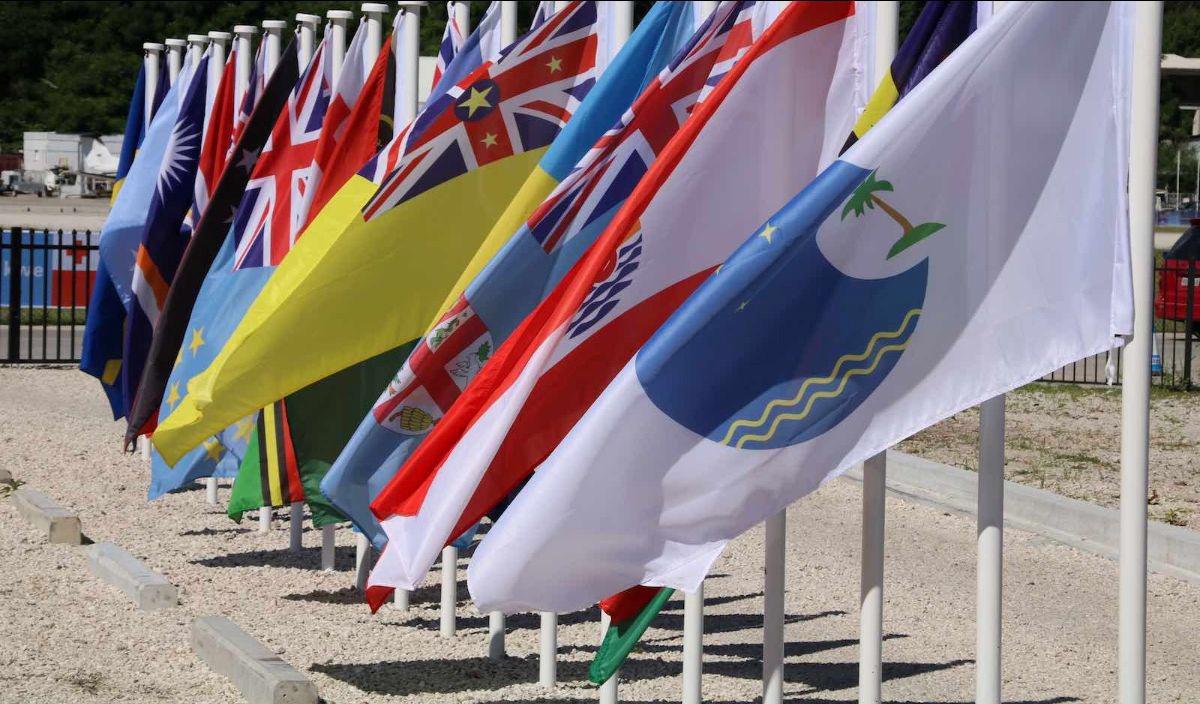
continued from front page
in full within the first two years of the sentence. A violation of any of these conditions could lead to her immediate incarceration.
The case sparked public outrage and concern across the community. The young victim was promptly removed from the home and is now under the care of a court-approved guardian.
continued from front page
detention.
Other FSM officials also spoke to Rhowuniong about the matter. Jeem S. Lippwe, the FSM’s Permanent Representative to the United Nations, responded, “The best people that may know or have contacts with the State Dept are my colleagues in DC. That may also have contacts with ICE, and I am sure they are looking into this as this is now a huge issue.”
FSM Consul General in Oregon, Dominic R. Maluchmai, echoed the uncertainty, telling Rhowuniong, “Like you, I also was made aware of the news by a government official. And if you don't mind, I would like to refer you to Ambassador Jackson Soram for details.”
According to Rhowuniong’s reporting, Ambassador Soram and his team in Washington have been in regular contact with the U.S. Department of Homeland Security (DHS) and ICE regarding the validity of the reports. “We await a follow-up report from them just to confirm if indeed no FSM
Child welfare advocates are now working to repatriate her to Fiji, where they believe she will be able to receive more comprehensive psychological, medical, and social support than is currently available in Pohnpei.
This case has pointed out substantial gaps in family protection mechanisms and the need for improved cross-border cooperation in cases involving foreign nationals and their families.
detainees are there,” Soram said.
He also emphasized that although FSM citizens have legal status in the United States under the Compact of Free Association, they may still face deportation if convicted of certain crimes. “Guantánamo has a notorious reputation for housing criminals of the worst kind,” Soram told Rhowuniong. “We want to avoid having any of our citizens sent there.”
He added that the FSM government has urged both DHS and ICE to coordinate closely with the Embassy on all deportation matters concerning FSM nationals. “This is very much a high priority for the Embassy and the Government—to ensure the safety and well-being of our citizens who are detained,” he said.
As of this report, there has been no confirmation from ICE that any FSM citizens are among those currently held in Guantánamo Bay.
The original story and quotes appeared in an article by Chikin Melele – a Marshallese news blog. The blog writer was Alex Rhowuniong. Content is used with permission.

By U.S. Embassy to the FSM
July 14, 2025
Pohnpei - Pearcylita D. Cubacub, a math and science teacher at Our Lady of Mercy Catholic High School, participated in the U.S. Department of State’s Study of the U.S. Institutes (SUSI) program from May 31 to July 5 at the Institute for Training and Development in Amherst, Massachusetts. SUSI is an academic program focusing on topics in U.S. studies for groups of foreign undergraduates, scholars, and teachers. The curriculum includes an intensive academic residency, a field experience to another region of the U.S., community service activities, and leadership development courses.
During her five-week stay in the U.S., Ms. Cubacub also attended a
workshop on teaching U.S. history through art, American family life, as well as a panel with local teachers. “Through our enriching class sessions, I gained a deeper understanding of the complex and inspiring history of the United States. Each discussion challenged me to think critically and reflect on how education can be a powerful force for change. Looking ahead, I am committed to applying the knowledge and insights I gained from SUSI to benefit my school and broader community,” said Ms. Cubacub.
"SUSI fosters a deeper understanding of the United States while supporting the professional development of future leaders through knowledge exchange. The collaborations with U.S. academic institutions and organizations further exemplify America's leadership and excellence in education,” U.S.

The SUSI application for local undergraduate students, university
scholars, and secondary educators is announced every October on the U.S. Embassy’s website (fm. usembassy.gov) and Facebook page (@ usembassykolonia).
By U.S. Embassy to the FSM
July 22, 2025
Pohnpei—Members of the United States Coast Guard Mobile Training Team (MTT) provided a Small Boat Operator Search and Rescue (SAR) and Towing training to partners at the FSM National Police Maritime Wing from June 9-20, 2025, in Pohnpei, Micronesia.
Each year, the MTT team travels to countries around the globe including the FSM to provide technical training and consulting services in maritime law enforcement, marine safety and environmental protection, small boat operation and maintenance, search and rescue, port security and infrastructure development for countries with maritime law enforcement programs.
This year, the team discussed and conducted practical underway applications of risk management, man overboard drills, vessel maneuvering, engine casualty controls, navigational charting, and search patterns –to help the FSM maritime law enforcement and emergency responders become more proficient with skills necessary to operate and strengthen SAR response across the FSM.
Participants included 29 officers from the FSM National Police Maritime Wing led by Chief Steward Peter, LCDR Paul Norton, and his team of Navy Maritime Security and Technical Advisors at the maritime agency. Hats off to both teams for a very productive two weeks of thorough and impressive Small Boat Operations course!


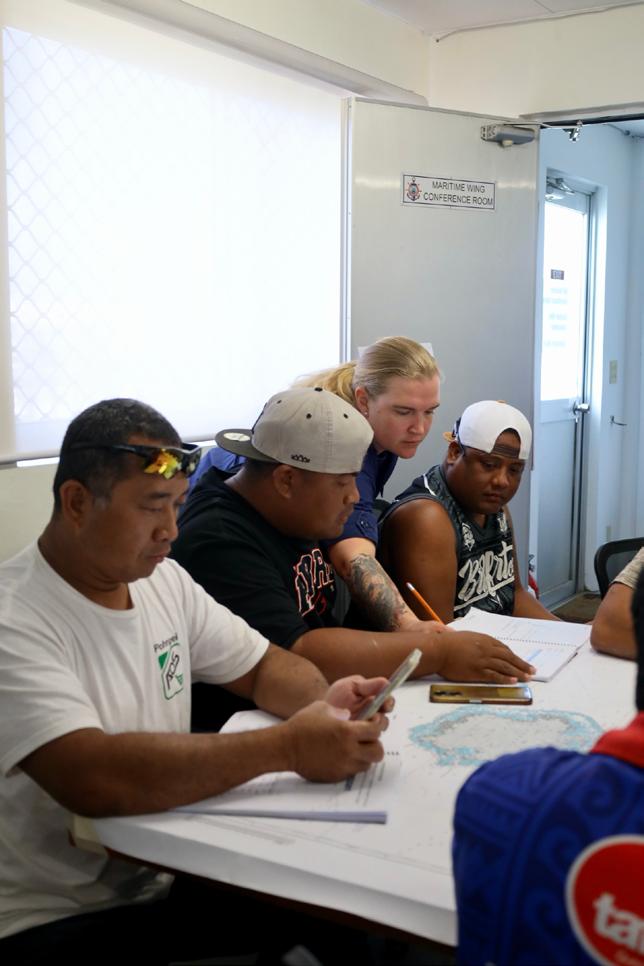
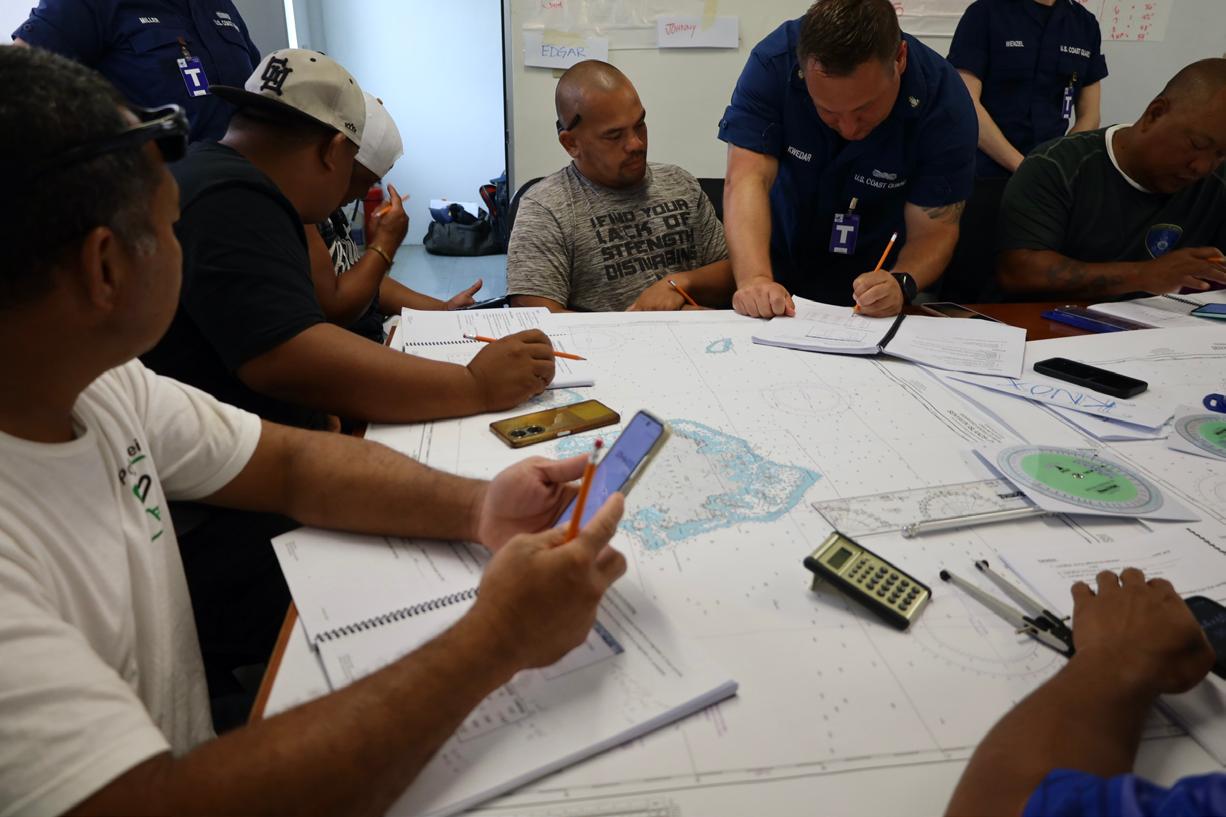

Notice is hereby given that Nissan Jidosha Kabushiki Kaisha (also trading as Nissan Motor Co., Ltd.) (a corporation organized and existing under the laws of Japan) of No. 2, Takara-cho, Kanagawa-ku, Yokohama-shi, Kanagawa-ken, Japan, is the sole owner and proprietor in the Federated States of Micronesia and elsewhere of the trade mark below:

which is used in connection with the following goods and services:
Class 12: Vehicles for locomotion by land, air, water or rail; automobiles; electric vehicles; waggons; trucks; vans [vehicles]; sport utility vehicles; motor buses; recreational vehicles (RV); sports cars; racing cars; lorries; fork lift trucks; tractors; towing tractors; trailers; semi-trailers; structural parts for automobiles; engines for land vehicles; motors for land vehicles; bodies for vehicles; vehicle chassis; transmission mechanisms for land vehicles; transmission shafts for land vehicles; gearing for land vehicles; clutches for land vehicles; axles for vehicles; vehicle suspension springs; shock absorbers for automobiles; vehicle wheels; tires for vehicle wheels; hubs for vehicle wheels; adhesive rubber patches for repairing tire inner tubes; brakes for vehicles; brake pads for land vehicles; windshields; windshield wipers [vehicle parts]; vehicle bumpers; steering units for land vehicles; horns for vehicles; direction signals for vehicles; vehicle seats; safety belts for vehicle seats; head-rests for vehicle seats; reversing alarms for vehicles; anti-theft devices for vehicles; air bags [safety devices for automobiles]; rearview mirrors; tailboard lifts [parts of land vehicles]; spoilers for vehicles; luggage carriers for vehicles; mudguards for vehicles; anti-skid chains; vehicle covers [shaped]; seat covers for vehicles; air pumps [vehicle accessories]; ski carriers for vehicles; cigar lighters for land vehicles; safety seats for children; hoods [folding roofs] for vehicles; doors for vehicles; space vehicles; aeroplanes; seaplanes; aircraft; carts; motorcycles; boats; ferry boats; ships; yachts; bicycles; ashtrays for automobiles; brake discs for vehicles; driverless cars [autonomous cars]; side view mirrors for vehicles; engine mounts for land vehicles; caps for vehicle petrol [gas] tanks; torque converters for land vehicles; autonomous land vehicles; bearings [parts of vehicles].
Class 35: Retail or wholesale services for land vehicles, structural parts and fittings therefor; dealerships in the field of land vehicles; sales promotion for others; advertising and publicity services for land vehicles; import-export agency services; providing information about land vehicles, namely, consumer product information and price comparison information; providing commercial information and advice for consumers in the choice of products and services; administration of consumer loyalty programs; showroom services; organization of exhibitions for commercial or advertising purposes; organization of trade fairs; vehicle fleet (business management of a -) [for others]; providing on-line showrooms for land vehicles for commercial purposes.
Class 36: Accident insurance underwriting; credit and cash card services; providing financial information; financing services; issuance of credit cards; appraisal of used automobiles; insurance services relating to land vehicles; providing of comprehensive warranty services for land vehicles, structural parts and fittings therefor; extended warranty insurance services; loans [financing]; automobile lease financing; lease purchase financing of vehicles; e-wallet payment services; providing insurance information.
Class 37: Repair or maintenance of land vehicles, parts and fittings therefor; providing information about repair or maintenance of land vehicles, parts and fittings therefor; repair or maintenance of chargers for electrical vehicles; repair or maintenance of batteries and cells; repair or maintenance of telecommunication machines and apparatus; vehicle breakdown repair services; charging of electric vehicles; tuning of bodies for automobiles; custom installation of exterior, interior and mechanical parts of vehicles [tuning]; rental of battery chargers; vehicle greasing; anti-rust treatment for vehicles; roadside assistance services, in particular responding to calls for roadside assistance, flat tire changing, emergency fuel supplying, battery jump starting, and emergency battery supplying.
Nissan Jidosha Kabushiki Kaisha (also trading as Nissan Motor Co., Ltd.) claims all rights in respect to the above trade mark and will take all necessary legal steps against any person, firm or corporation counterfeiting, imitating, violating or otherwise infringing its rights in the Federated States of Micronesia.
JAMES & WELLS
Level 2, Building E, Union Square, 192 Anglesea Street, Hamilton, 3204, New Zealand
Email: info@jamesandwells.com www.jamesandwells.com
JAMES & WELLS
Notice is hereby given that Nissan Jidosha Kabushiki Kaisha (also trading as Nissan Motor Co., Ltd.) (a corporation organized and existing under the laws of Japan) of No. 2, Takara-cho, Kanagawa-ku, Yokohama-shi, Kanagawa-ken, Japan, is the sole owner and proprietor in the Federated States of Micronesia and elsewhere of the trade mark below:
which is used in connection with the following goods and services:
Class 12: Vehicles for locomotion by land, air, water or rail; automobiles; electric vehicles; waggons; trucks; vans [vehicles]; sport utility vehicles; motor buses; recreational vehicles (RV); sports cars; racing cars; lorries; fork lift trucks; tractors; towing tractors; trailers; semi-trailers; structural parts for automobiles; engines for land vehicles; motors for land vehicles; bodies for vehicles; vehicle chassis; transmission mechanisms for land vehicles; transmission shafts for land vehicles; gearing for land vehicles; clutches for land vehicles; axles for vehicles; vehicle suspension springs; shock absorbers for automobiles; vehicle wheels; tires for vehicle wheels; hubs for vehicle wheels; adhesive rubber patches for repairing tire inner tubes; brakes for vehicles; brake pads for land vehicles; windshields; windshield wipers [vehicle parts]; vehicle bumpers; steering units for land vehicles; horns for vehicles; direction signals for vehicles; vehicle seats; safety belts for vehicle seats; head-rests for vehicle seats; reversing alarms for vehicles; anti-theft devices for vehicles; air bags [safety devices for automobiles]; rearview mirrors; tailboard lifts [parts of land vehicles]; spoilers for vehicles; luggage carriers for vehicles; mudguards for vehicles; antiskid chains; vehicle covers [shaped]; seat covers for vehicles; air pumps [vehicle accessories]; ski carriers for vehicles; cigar lighters for land vehicles; safety seats for children; hoods [folding roofs] for vehicles; doors for vehicles; space vehicles; aeroplanes; seaplanes; aircraft; carts; motorcycles; boats; ferry boats; ships; yachts; bicycles; ashtrays for automobiles; brake discs for vehicles; driverless cars [autonomous cars]; side view mirrors for vehicles; engine mounts for land vehicles; caps for vehicle petrol [gas] tanks; torque converters for land vehicles; autonomous land vehicles; bearings [parts of vehicles].
Class 35: Retail or wholesale services for land vehicles, structural parts and fittings therefor; dealerships in the field of land vehicles; sales promotion for others; advertising and publicity services for land vehicles; import-export agency services; providing information about land vehicles, namely, consumer product information and price comparison information; providing commercial information and advice for consumers in the choice of products and services; administration of consumer loyalty programs; showroom services; organization of exhibitions for commercial or advertising purposes; organization of trade fairs; vehicle fleet (business management of a -) [for others]; providing on-line showrooms for land vehicles for commercial purposes.
Class 36: Accident insurance underwriting; credit and cash card services; providing financial information; financing services; issuance of credit cards; appraisal of used automobiles; insurance services relating to land vehicles; providing of comprehensive warranty services for land vehicles, structural parts and fittings therefor; extended warranty insurance services; loans [financing]; automobile lease financing; lease purchase financing of vehicles; e-wallet payment services; providing insurance information.
Class 37: Repair or maintenance of land vehicles, parts and fittings therefor; providing information about repair or maintenance of land vehicles, parts and fittings therefor; repair or maintenance of chargers for electrical vehicles; repair or maintenance of batteries and cells; repair or maintenance of telecommunication machines and apparatus; vehicle breakdown repair services; charging of electric vehicles; tuning of bodies for automobiles; custom installation of exterior, interior and mechanical parts of vehicles [tuning]; rental of battery chargers; vehicle greasing; anti-rust treatment for vehicles; roadside assistance services, in particular responding to calls for roadside assistance, flat tire changing, emergency fuel supplying, battery jump starting, and emergency battery supplying.
Nissan Jidosha Kabushiki Kaisha (also trading as Nissan Motor Co., Ltd.) claims all rights in respect to the above trade mark and will take all necessary legal steps against any person, firm or corporation counterfeiting, imitating, violating or otherwise infringing its rights in the Federated States of Micronesia.
JAMES & WELLS
Level 2, Building E, Union Square, 192 Anglesea Street, Hamilton, 3204, New Zealand
Email: info@jamesandwells.com www.jamesandwells.com
JAMES & WELLS

Pacific Association of Supreme Audit Institutions
24 July 2025
Yap—The Pacific Association of Supreme Audit Institutions (PASAI) has completed a successful mission visit to Yap State in the Federated States of Micronesia with some audit capacity building and advocacy for good governance from 16 to 18 July 2025.
Led by Program Director, Sophia H Pretrick, the mission’s 2 key objectives were to provide in-house training and technical assistance to the staff of the Yap State Office of the Public Auditor and to engage in high-level advocacy with public sector leaders on the importance of audit independence and good governance principles.
The training sessions focused on strengthening the skills of staff in the audit office’s Compliance Investigation Unit, which investigates fraud, waste and mismanagement in government operations.
Staff participated in workshops covering ethics in government, fraud awareness, investigation planning, evidence handling and interview techniques, alongside an introduction to the Certified Fraud Examiner (CFE) professional development program.
Ms Pretrick commended the local audit staff members’ dedication to developing their investigation capabilities, saying, “PASAI is proud to support members through mentoring, technical assistance and by helping to align their manuals and practices with international standards.
Australian Embassy to the FSM
July 18, 2025
Pohnpei—Australian Ambassador Grant and Senior Program Manager Kathleen Kostka were pleased to participate in a showcase of UN agencies at the UN Multi-Country Office on 17 July, together with other development partners US, Japan and China.
Regional Coordinator Tapan Mishra explained the UN80 reform process where the UN aimed to work smarter, trusted and responsively to achieve real impact for the countries of the North Pacific. He said agencies and partners have a shared commitment to deliver the Sustainable Development Goals in a rapidly evolving global context.
Ambassador Grant said Australia welcomed the UN efforts to help align resources across the Pacific and reiterated the importance of reducing duplication between agencies.
Agencies such as IOM, UNDP, UNFPA presented their work in interactive displays and briefings for partners, including the Pacific Community and the World Bank.


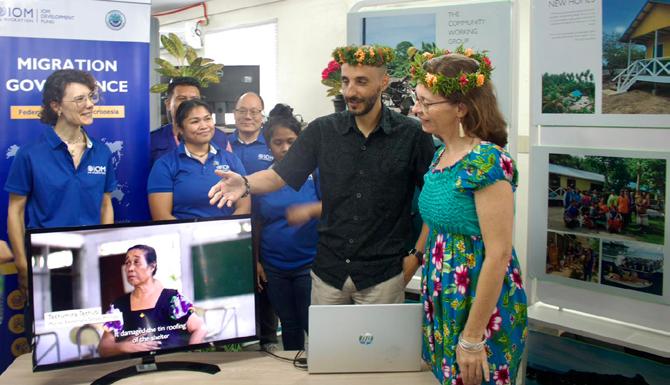

“Supporting staff to gain CFE certification aligns with our vision of transparent and accountable public administration for the benefit of all Pacific peoples.”
Accompanied by the Public Auditor, Bryan Dabugsiy, and Chief Investigator, Marie Laamar, Ms Pretrick explained PASAI’s role in the broader Pacific region in a meeting with the Acting Governor, the Attorney General, the Director of the Office of Administrative Services, the Director of Planning and Budget and the Human Trafficking Coordinator.
As part of her advocacy activities, Ms Pretrick also delivered a targeted session for members of the 11th Yap State Legislature on the role of government audit offices in fostering accountability,
transparency and integrity.
She presented the results formal assessments of regional audit offices’ levels of independence, highlighting the local office’s status and the importance of legislative support for an upcoming bill designed to strengthen its independence.
“I’m encouraged by the commitment expressed by Yap State legislators to working with the Office of the Public Auditor on legislative reform and to make use of its audits to improve public governance,” Ms Pretrick said.
PASAI acknowledges the support of the New Zealand Ministry of Foreign Affairs and Trade (MFAT) and the Australian Department of Foreign Affairs and Trade (DFAT).
Pacific Islands Forum Secretariat
21 July 2025
Suva, Fiji – The 2025 Pacific Islands Forum Women Leaders Meeting (PIFWLM) will take place from 22 to 25 July 2025 in Suva, bringing together eighteen (18) member countries to reflect on progress and accelerate collective action on the commitments set out in the revitalized Pacific Leaders Gender Equality Declaration (revitalized PLGED).
Held annually since 2022, the PIFWLM continues to serve as a key platform to advance gender equality and social inclusion, in direct alignment to the vision and implementation of the 2050 Strategy for the Blue Pacific Continent.
The meeting will be chaired by the Minister of Internal Affairs for Tonga, Hon Sinaitakala Tu'itahi.
Forum Secretary General Baron Waqa highlighted the significance of the meeting, “This is more than just a meeting. It is a moment
to affirm our collective resolve to embed gender equality and social inclusion at the heart of Pacific political leadership and regional cooperation.”
The 2025 PIFWLM Week will feature high-level engagements including ministerial dialogues, strategic Talanoa sessions, and multi-stakeholder conversions with civil society, and Pacific youth. The conversations will span key themes such as inclusive governance, gender-responsive leadership and the role of women in peace.
The formal two-day meeting of Women Leaders will commence on 24 July, concluding with a press conference on 25 July to share key outcomes and decisions.
The PIF Women Leaders Meeting forms part of ongoing efforts to strengthen inclusive leadership and policy development across the Forum regional architecture, with the support of agencies of the Council of Regional Organizations in the Pacific (CROP) and development partners.

By Chief Warrant Officer Sara Muir U.S. Coast Guard Forces Micronesia / Sector Guam
July 22, 2025
Santa Rita, Guam — The USCGC Myrtle Hazard (WPC 1139) crew completed a 29-day operational period on July 14, covering nearly 300 operational hours in the waters around Guam, the Commonwealth of the Northern Mariana Islands (CNMI), and the Republic of Palau.
The crew patrolled maritime borders, enforced federal laws, and conducted bilateral operations with Palau partners to counter illegal, unreported, and unregulated fishing under the U.S.-Palau bilateral maritime law enforcement agreement.
The cutter deployed to Palau, embarking two Palauan maritime
officers from the Division of Marine Law to conduct shared maritime law enforcement operations and enhance interoperability. The cutter boarding team and the Palauan maritime officers executed a bilateral boarding, enhancing cooperation and protecting regional waters.
Additionally, the Myrtle Hazard crew spent time on patrol in the Marianas during this period delivering sustained presence and aids-to-navigation supplies to Marine Safety Unit Saipan for use by a jump team from the USCGC Hickory (WLB 212) to correct outstanding discrepancies while the buoy tender is away for heavy maintenance, supporting maritime safety in the CNMI.
“Our close collaboration with our valued regional partners is instrumental in promoting a secure and
prosperous Pacific,” said Lt. Emma Saunders, commanding officer of Myrtle Hazard. “The dedication of our crew, combined with the strong teamwork displayed by Palau’s maritime officers, significantly enhanced our collective ability to safeguard these waters through cross-agency cooperation for a rules-based Pacific.”
The effort advanced Operations Blue Pacific and Rematau to detect, deter, and disrupt illegal maritime activities while maintaining an operational presence to enhance maritime domain awareness around U.S. and shared maritime borders. The crew qualified personnel in multiple positions including underway officer of the deck, boarding team member, boat engineer, and deck-in-charge
personnel, bolstering operational readiness.
Lt. Cmdr. Derek Wallin, the U.S. Coast Guard Forces Micronesia/ Sector Guam’s maritime advisor, emphasized the value of international partnerships, “Working hand-inhand with Palau through the bilateral maritime law enforcement agreement deepens our ties and increases our shared capabilities.”
The U.S. Coast Guard remains steadfast in defending the nation's maritime interests, securing vital shipping lanes, and safeguarding the region's waters. Myrtle Hazard's patrol underscores the Service's enduring role in enforcing U.S. sovereignty and laws, deterring illicit activity, and ensuring the safety of all mariners and waterway users.
By Lieutenant Commander Andrew Bertucci
July 9, 2025
Joint Base Pearl Harbor-Hickam, Hawaii—Pacific Partnership 2025 (PP-25) officially kicks off with the arrival of the Harpers Ferry-class dock landing ship USS Pearl Harbor (LSD 52) at Joint Base Pearl Harbor-Hickam, led by Rear Admiral Todd F. Cimicata, U.S. Pacific Fleet Executive Agent for Pacific Partnership, and the mission commander, U.S. Navy Captain Mark B. Stefanik.
The PP-25 team, embarked aboard the Harpers Ferry-class dock landing ship USS Pearl Harbor (LSD 52), arrived at Joint Base Pearl Harbor-Hickam to make final preparations ahead of its upcoming port visits throughout the Indo-Pacific region. The PP-25 team will conduct medical exchanges, engineering projects, community outreach, and disaster preparedness engagements with host nation partners.
“Pacific Partnership is a testament to what we can achieve together,” said Cimicata. “By working alongside
our allies and partners, we strengthen regional capacity and resilience and lay the foundation for a collective response to crises. It’s about preparing in calm to respond in crisis.”
This year’s PP-25 mission will include mission stops in Papua New Guinea, Federated States of Micronesia, Palau, Samoa, and Vanuatu. Prior to the USS Pearl Harbor's departure, separate fly-in missions were conducted in the Philippines, Fiji, and Tonga in June.
“This enduring mission provides us the opportunity to build on our relationships, share expertise, and learn from one another,” said Stefanik. “Our shared experiences help create more resilient communities, and I’m proud to lead a team committed to strengthening partnerships across the Indo-Pacific.”
Pacific Partnership brings together more than 1,500 personnel from the United States and participating nations including Australia, Canada, Germany, Japan, New Zealand, Republic of Korea, Singapore, and the United
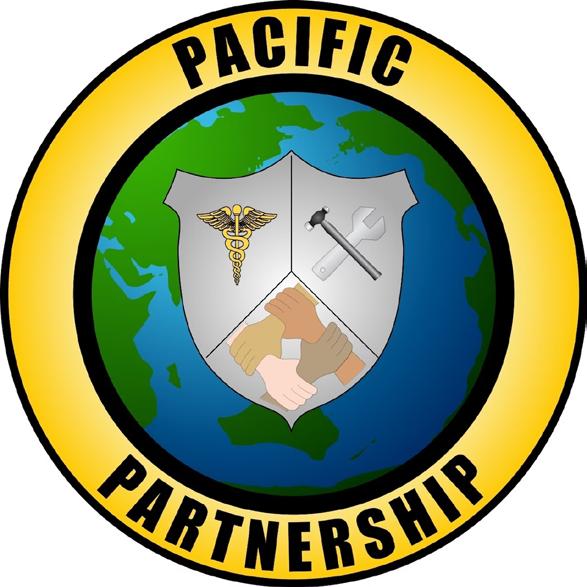
Kingdom. Activities will include engineering projects at schools and clinics, medical subject matter expert exchanges, and performances by the Pacific Partnership Band, composed of musicians from the U.S. Pacific Fleet and partner nations.
The mission team will work alongside allies and partners to strengthen relationships, bolster host nation capacity to provide essential humanitarian services, and support efforts to reduce the risk of, prepare for, and respond to disasters.
Every day, the U.S. Pacific Fleet operates to protect the security, freedom, and prosperity for the U.S.
and our allies and partners. The U.S. Pacific Fleet continues to advance a shared vision, alongside our allies and partners, of a free, open, and secure Indo-Pacific.
Now in its 21st iteration, the Pacific Partnership series is the largest annual multinational humanitarian assistance and disaster management preparedness mission conducted in the Indo-Pacific. Pacific Partnership works collaboratively with host and partner nations to enhance regional interoperability and disaster response capabilities, increase security and stability in the region, and foster new and enduring friendships in the IndoPacific.

The Nature Conservancy
July 21, 2025
Palau—The Palau International Coral Reef Center (PICRC) has just completed coral reef ecosystem monitoring across 31 sites around Palau’s main islands. This effort was made possible through support from the Nature Conservancy (TNC) as part of a regional initiative funded by the Global Fund for Coral Reefs (GFCR) under the Micronesia Coral Reefs Program, which aims to protect and restore reefs across Micronesia.
Surveys were carried out by PICRC researchers between October and December 2024, with additional analysis completed in June 2025. Led by PICRC researcher Victor Nestor, the team used photo quadrats and stereovideo systems to collect detailed data on corals, invertebrates, and fish.
PICRC has been monitoring Palau’s reefs since 2001, building one of the longest and most comprehensive coral reef datasets in the region. This longterm work helps researchers detect changes in our reefs, whether from natural events or human activity. It also serves as a valuable tool to evaluate the
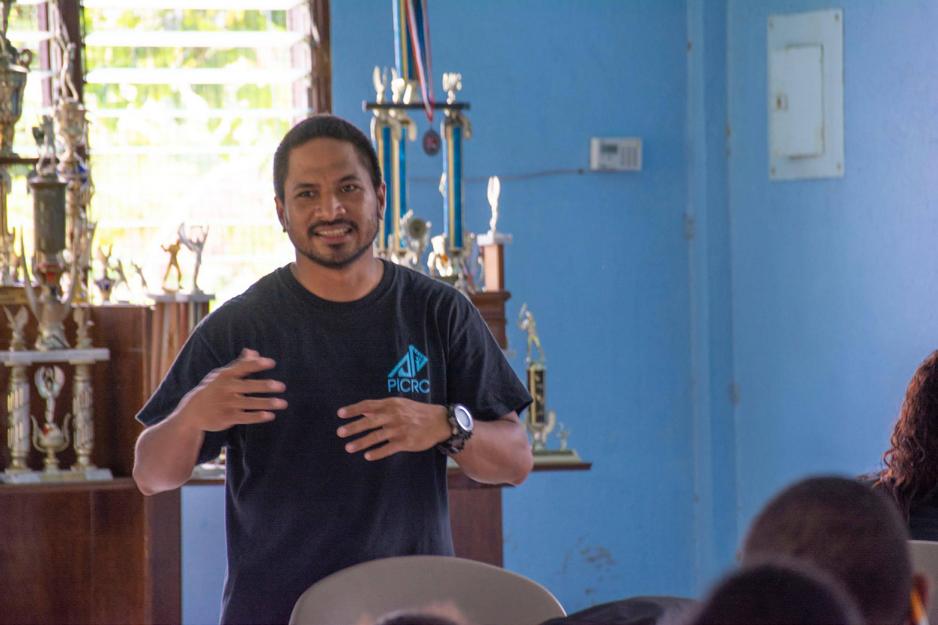
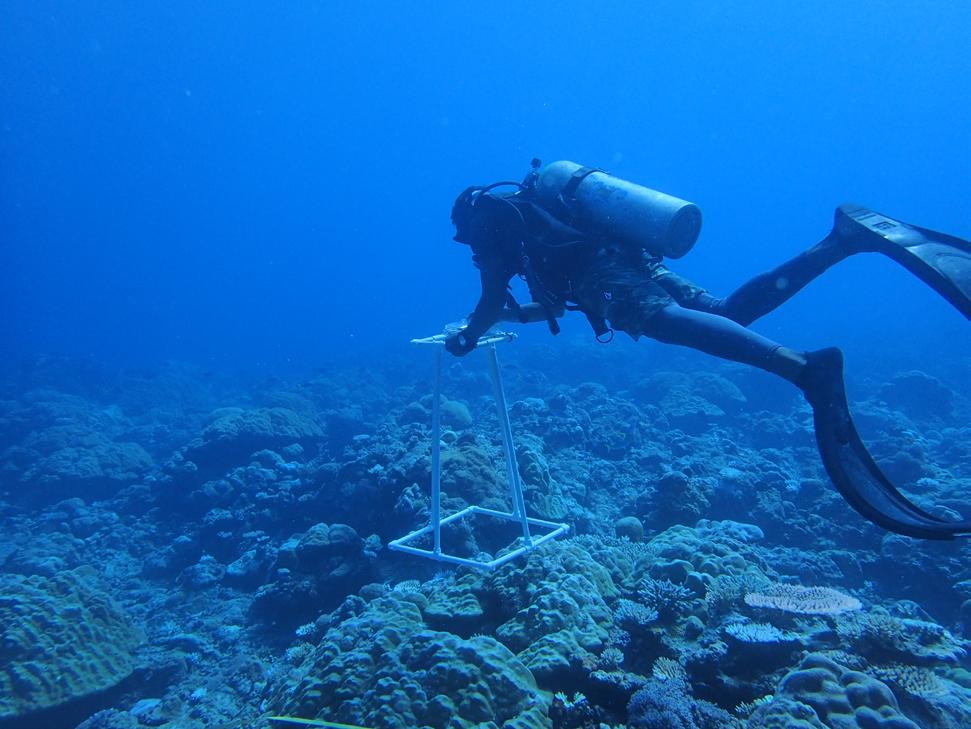
effectiveness of marine conservation and management strategies, guiding future decisions to better protect and restore these vital ecosystems.
The results from this year’s monitoring have already been shared with TNC and will be used to evaluate the impact of GFCR-supported efforts to protect and restore coral reefs in Palau.
“Information on the status of Palau’s reefs gained by long-term coral reef monitoring is essential for effective management of coral reefs,” said Dr. Yimnang Golbuu, Coral Resilience Director at TNC Micronesia and Polynesia. “They not only tell us how the reefs are responding to different disturbances, including climate change, but also show us how effective our management efforts are. We are fortunate to partner with organizations such as PICRC, which has the experience, expertise, and long-term commitment to coral reef monitoring and management in Palau.”
By Bill Jaynes The Kaselehlie Press
July 22, 2025
Suva, Fiji—Tuvalu’s Prime Minister Hon. Feleti Teo has called for a deeper and more inclusive understanding of peace, urging Pacific leaders and communities to embed gender equality and social inclusion at the core of the region’s Ocean of Peace Initiative.
Speaking at the Ocean of Peace Talanoa in Suva on July 22, Teo said that peace cannot be achieved by focusing solely on the absence of conflict, but must also include justice, equality, and mutual care.
“Peace is not simply the absence of conflicts,” Prime Minister Teo said. “Peace occurs where there is the presence of justice, where there is social inclusion, and where there is
respect of relationships grounded in mutual care and responsibility.”
The Ocean of Peace Declaration, a regional effort now under development for submission to Pacific Islands Forum (PIF) Leaders in September, builds on an initiative initially championed by Fijian Prime Minister Sitiveni Rabuka. It was formally adopted as a PIF initiative last year in Tonga and is now being shaped through regional dialogues like this week’s Talanoa.
“With the presence in Suva this week of ministers and senior government officials and representatives of civil society who are responsible for gender equality and social inclusion,” Teo said, “it is a timely opportunity to hear their perspectives on how these values could contribute to the advocacy and maintenance of peace.”
Drawing from Tuvalu’s national experience, the Prime Minister offered five main observations, beginning with the need for a shared understanding of peace. He urged participants to look beyond geopolitical dynamics and examine how peace is expressed— or denied—in the everyday lives of Pacific people.
“We are in fact talking about the deeper fabrics and structures of our societies,” he said. “About how we treat each other in our homes, how we treat each other in our villages, and in our institutions.”
He warned against regional aspirations of peace that ignore the lived realities of many Pacific communities, especially women and children.
“We cannot expect peace in our region while there is violence in our homes and villages,” Teo said. “We cannot
claim for the Pacific the trophy of Ocean of Peace, while our women live in fear, while our children witness or experience abuse behind closed doors, while half of our people are excluded from decisions that shape their future.”
Reinforcing the long-term vision of the 2050 Strategy for the Blue Pacific Continent, Teo concluded with a clear message: “Peace must begin at home. And peace must be lived every day, in the choices we make, in the policies we craft, and in the relationships we build.”
The Talanoa continues this week as part of regional efforts to refine and strengthen the Ocean of Peace Declaration ahead of its formal presentation at the upcoming PIF Leaders meeting in Honiara, Solomon Islands.

The author, Sanju Adkihari is a Chartered Accountant in profession and writing various economic articles from 2012 in various international journals
Public Financial Management (PFM) matters more than ever now, its significance expanding to encompass a wide and diverse array of functions critical for national well-being. In the dynamic and often resource-constrained landscape of the Pacific, robust PFM isn't merely an administrative detail; it's the bedrock upon which sustainable development, resilient economies, and improved public services are built.
At its core, Public Financial Management is the correct, complete, and accountable stewardship of public funds. The objective is to ensure public funds are properly utilized and protected from misuse or wastage. This imperative is particularly acute where public resources are scarce, making their prudent use paramount. As a vital field of economics, public finance concerns itself with how governments raise revenue, how those funds are deployed, and the farreaching effects of these activities on the national economy and society. A public financial management (PFM) system refers to the set of laws, rules, systems, and processes which every level of governments uses to manage public resources, revenue mobilization, expenditure management, accounting, and auditing. It's a critical component of good governance, ensuring public funds are used effectively and transparently to deliver essential services and achieve development goals. PFM systems encompass the entire cycle of public finance, from policy design to external audit and evaluation.
The scope of PFM is broad, encompassing several critical areas, each indispensable for effective governance:
1. Budget Planning and Execution: The meticulous process of allocating resources to national priorities and ensuring their efficient disbursement.
2. Government Accounting System: Transparent and accurate record-keeping, crucial for accountability and informed decisionmaking.
3. Revenue Administration System: The effective collection of taxes and other public revenues to fund essential services.
4. Public Procurement System: Fair, transparent, and efficient acquisition of goods and services for the public sector.
5. Internal Control & Auditing: Mechanisms to safeguard public assets and ensure compliance with financial regulations.
6. Accountability & Oversight Bodies: Independent institutions that scrutinize government spending and hold public officials responsible.
Leading institutions further underscore PFM’s significance. The IMF, in 2013, defined PFM as "integrated efforts of institutions, processes, and systems that ensures public sector financial resources are raised, allocated, and utilized effectively and efficiently. These institutions, processes, and systems are the PFM architecture." Similarly, the Chartered Institute of Public Finance & Accountancy (CIPFA) defines PFM as "the system by which financial resources are planned, directed and controlled to enable and influence the efficient and effective delivery of public service goals." These definitions highlight PFM as a holistic, integrated framework for financial governance.
The legal arrangements underpinning sound PFM are equally vital, typically embedded within a nation's constitutional and legislative framework. These include the Constitution itself, providing the overarching legal basis for financial governance; Parliament Regulations & Manuals, guiding legislative oversight; Financial Procedure & Fiscal Accountability Acts, detailing rules for managing public funds; Taxation Laws, governing revenue collection; Multi-Year Government Plans, setting strategic financial objectives; Procurement Laws, ensuring fairness and transparency in government
purchasing; and robust Accounting and Audit Institutions, establishing independent bodies for financial oversight.
Despite its critical importance, Pacific countries, particularly in the North Pacific, face significant PFM challenges. These issues are often exacerbated by the unique characteristics of small island developing states:
• Pervasive Capacity Constraints: Many Pacific nations grapple with a limited pool of skilled PFM professionals. High staff turnover, competition from the private sector, and a "brain drain" mean trained personnel frequently leave public service, stretching existing staff thin across numerous critical functions. Capacity building efforts, while numerous, often lack the long-term sustainability needed to truly institutionalize expertise.
• Volatile Budget Planning and Execution: Budgeting processes can be unrealistic, with revenue forecasts proving overly optimistic and expenditure commitments not fully reflected. In-year spending decisions may be ad hoc, leading to uncontrolled aggregate expenditure and significant deviations from planned allocations. This can result in unsustainable fiscal deficits and a troubling disconnect between stated policy priorities and actual resource deployment. Major PFM issues and audit highlights of North Pacific Countries frequently point to systemic weaknesses in budget execution.
• Ineffective Revenue Administration: While some Pacific countries have made strides in tax reform, many still grapple with untapped tax potential. Tax offices are often understaffed, underfunded, and operate with outdated technology, hindering compliance, reducing collection efficiency, and making it challenging to broaden the tax base. The heavy reliance on volatile trade taxes, which have declined due to trade liberalization, underscores the urgent need for robust and diversified domestic revenue mobilization.
• Limited Transparency and Accountability Frameworks: Inadequate financial reporting, chronic
delays in audit processes, and a lack of readily available public information can erode public trust and create fertile ground for the misuse of funds. While external audit institutions exist, their effectiveness is frequently hampered by resource limitations and insufficient legal mandates to enforce findings.
• Profound Vulnerability to External Shocks: Pacific economies are profoundly susceptible to external shocks, including the escalating impacts of climate change, natural disasters, and global economic downturns. Weak PFM systems limit their ability to respond effectively to these crises, often leading to increased reliance on borrowing and further fiscal strain. Managing climate change adaptation and disaster risk reduction also adds significant and growing fiscal demands that current PFM systems may be illequipped to handle.
• Fragmented and Manual Systems: Many PFM functions still heavily rely on manual processes or disparate, outdated IT systems. This fragmentation makes data reconciliation difficult, prone to errors, and agonizingly slow. The lack of integration severely hampers real-time financial reporting and comprehensive oversight, preventing governments from having a clear, immediate picture of their financial health.
Charting a New Course: Reforms and the Digital Horizon
Recognizing these formidable challenges, many Pacific governments, often with the crucial support of development partners like the IMF, World Bank, and the Pacific Financial Technical Assistance Centre (PFTAC), are undertaking significant PFM reforms. These initiatives emphasize country ownership and a tailored approach, moving away from a "onesize-fits-all" blueprint.
• Strategic PFM Roadmaps: Countries are increasingly developing comprehensive PFM reform roadmaps, such as the Federated States of Micronesia's (FSM) Public Financial Management Reform Roadmap 20232026. These detailed plans aim to
continued on next page

By Bill Jaynes The Kaselehlie Press
July 24, 2025
Suva, Fiji—Ministers and senior leaders from across the Pacific convened today at the Pacific Islands Forum Secretariat in Suva for the 4th Pacific Islands Forum Women Leaders Meeting (PIFWLM), with Tonga’s Minister of Internal Affairs, Hon. Sinaitakala Tu’itahi, presiding as Chair.
In her opening address, Minister Tu’itahi welcomed delegates and acknowledged the Government and People of Fiji for hosting the gathering. She discussed the significance of the meeting as a growing platform for bold, solutions-oriented dialogue aimed at advancing gender equality and social inclusion across the Pacific.
“This meeting does not stand alone,” Tu’itahi said, pointing to a wider series of discussions taking place throughout
continued from previous page
establish stronger linkages between policy planning and budgeting, improve revenue mobilization, enhance expenditure management, and foster greater transparency. The focus is on a structured, incremental approach to reform that addresses specific gaps, enhances existing arrangements, and eliminates persistent shortcomings.
• Targeted Revenue Management Reforms: Efforts are vigorously underway to boost domestic revenue mobilization. This includes the introduction or strengthening of Value Added Tax (VAT) or Goods and Services Tax (GST), with countries like Palau initiating new VAT systems and others refining existing ones by broadening the base and reducing exemptions. Tax administration is undergoing modernization, with investments in technology upgrades for tax offices, the rollout of online registration platforms (e.g., in Fiji), and extensive capacity building for tax administrators to improve compliance and collection efficiency. Furthermore,
the week, including the regional economic outlook, the Ocean of Peace Talanoa, and youth-focused dialogues.
“Our progress relies on a whole-ofcommunity, whole-of-government, and whole-of-region approach.”
The Minister called for integrated, rather than siloed, efforts in tackling systemic challenges and praised the strength and resilience of Pacific women who continue to lead and innovate in the face of complex issues. Among the emerging challenges identified were the misuse of artificial intelligence, threats to traditional knowledge and intellectual property, political instability, drug abuse, HIV, and technology-facilitated genderbased violence.
Tu’itahi talked of the importance of supporting women leaders with strong data and evidence to inform actions. She welcomed discussions on the Pacific Regional Gender Equality Monitoring,
there is growing attention to fiscal risk management, identifying, quantifying, and mitigating risks associated with natural disasters, climate change, and state-owned enterprises.
• The Transformative Power of ICT-based PFM Systems: What is ICT based PFM System and it can be a game changer for North Pacific Countries like FSM? An Information and Communication Technology (ICT) based PFM system, or Financial Management Information System (FMIS), represents a pivotal reform. It integrates various PFM functions— from budgeting and accounting to procurement and auditing—into a cohesive, digital platform. For island nations like FSM, implementing and leveraging an FMIS offers profound, game-changing benefits:
Enhanced Budget Execution and Reporting: An FMIS enables timely and accurate recording of financial transactions, providing realtime data for in-year budget reporting and vastly improved cash management. This ensures funds are available when needed and significantly reduces the risk of overspending.
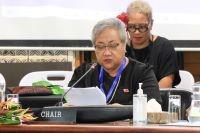
Evaluation, Research, and Learning Plan and the upcoming 2025 Pacific Gender Equality Report, calling them “vital foundations” for accountability, transparency, and measurable progress.
“This is also a time for honest reflection—not only to celebrate our achievements but to critically assess how we work, how we lead, and how we adapt,” she said. “The choices we make now will determine our capacity to adapt in the years ahead.”
Unprecedented Transparency and Accountability: By centralizing financial data and automating processes, an FMIS provides prompt, efficient access to reliable financial information. This bolsters transparency to parliament, the public, and external agencies, making it significantly easier to track public funds and hold officials accountable. The World Bank's Strengthening Public Financial Management (PFM I) project in FSM, for instance, specifically supports leveraging FMIS data for enhanced budgeting and transparency initiatives.
Streamlined Operations: Automating tasks in procurement, payroll, and payment processing reduces manual effort, minimizes errors, and dramatically speeds up operations, leading to greater overall efficiency.
Strengthened Internal Controls: An FMIS can embed robust internal controls directly into the system, automatically regulating financial transaction cycles and significantly enhancing the audit trail.
Data-Driven DecisionMaking: Access to comprehensive, real-time financial data empowers policymakers to make more informed,
Closing her remarks, Tu’itahi paid tribute to the many roles Pacific women play—from caregivers and craftswomen to entrepreneurs and leaders—describing them as “the backbone of our collective strength.”
The PIFWLM continues this week, bringing together ministers responsible for gender equality and social inclusion, representatives from the Council of Regional Organizations in the Pacific (CROP), and international partners, including the United Nations
evidence-based decisions about resource allocation, macroeconomic management, and policy implementation.
The successful implementation of an FMIS requires substantial investment, not just in technology, but crucially in human capacity development, robust change management strategies, and a clear, supportive legal and regulatory framework. Countries are increasingly focusing on building strong local ownership and ensuring that these vital reforms are meticulously adapted to their specific contexts and existing administrative capacities.
In conclusion, the prudent management of public funds in Pacific nations is not merely a technical exercise; it is a fundamental investment in the prosperity, resilience, and well-being of the Pacific people. By prioritizing and investing in robust PFM, particularly through the strategic adoption of innovative ICT-based solutions like integrated FMIS, Pacific nations can not only overcome existing hurdles but also lay an unshakable foundation for a future of enhanced public service delivery, economic stability, and truly sustainable growth.

FSM Petroleum Corporation
July 23, 2025
Chuuk—The FSMPC Board of Directors presented to the Chief Executive Council (CEC) as mandated by PL 15-08. The fourth meeting of the CEC was held at the Chuuk Governor’s Auditorium on July 8, 2025. The last CEC oversight meeting was held in Pohnpei in 2020. The CEC membership is defined in Section 5 of PL-15-08 as the FSM President, Kosrae State Governor, Pohnpei State Governor, Chuuk State Governor and Yap State Governor. This year’s CEC was attended by President Simina, Governor Palik of Kosrae, Governor Stevenson of Pohnpei, Governor Narruhn of Chuuk and Acting Governor Itimai of Yap.
The FSMPC, also known as Vital has its missions defined in public laws PL1508 (15th Public Laws), PL15-21 (15th Public Laws), PL18-68(18th Public Laws) and PL22-171 (22nd Public Laws). This event allowed the CEC to obtain updates, seek information, and provide direction as needed to the Board of Directors on progress and achievements against these missions.
A site visit to the Chuuk Bulk Plant enabled the Principals and their respective cabinet members valuable insight into the daily operations and the types of infrastructure maintenance programs and projects needed to assure energy security and safe operations. Later that day, the group visited the Tonoas construction site — future home of the coconut processing facility. This project is a key component of the Coconut Export Strategy and a major step toward revitalizing the coconut industry in the FSM.
During the second day of the meeting, a comprehensive update on oversight, governance and operational and commercial performance was provided. The presentation highlighted progress made, ongoing initiatives, and the Corporation’s continued commitment to supporting the people and economic growth of the FSM.
The board, staff and management of the company is grateful for the opportunity to critically assess its performance and identify areas for improvement.

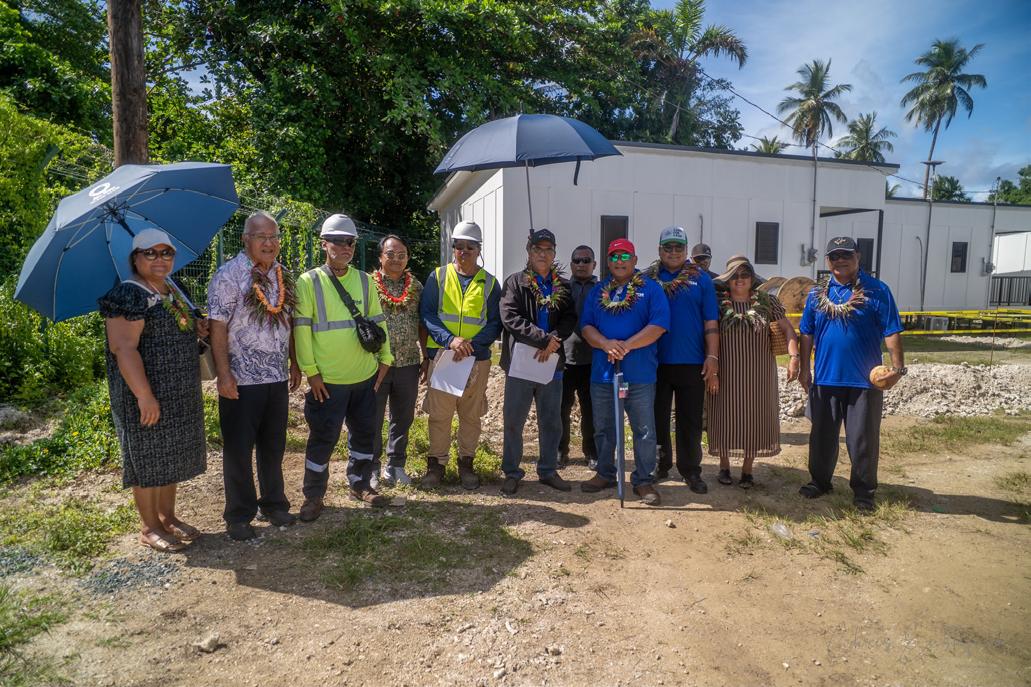

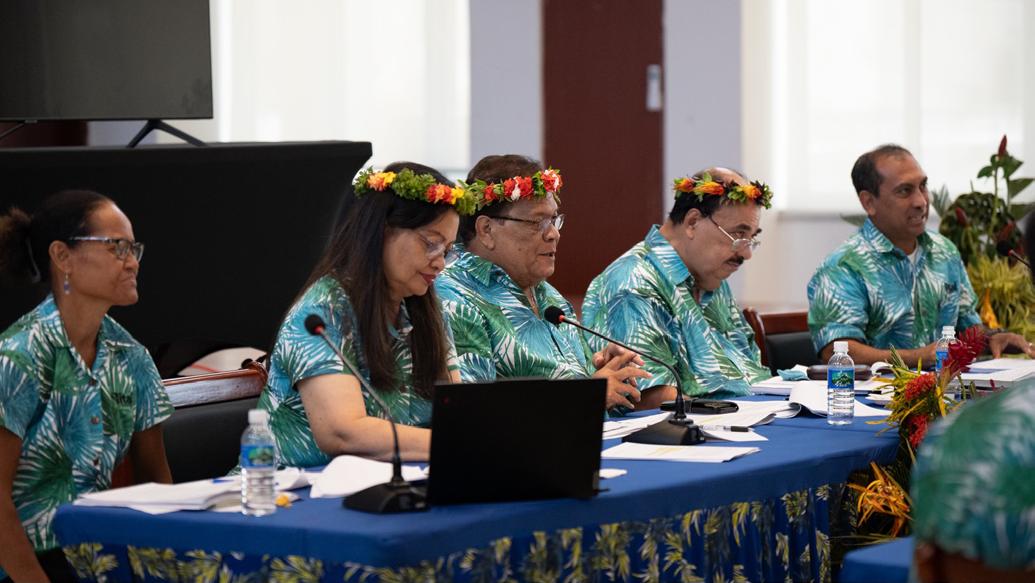
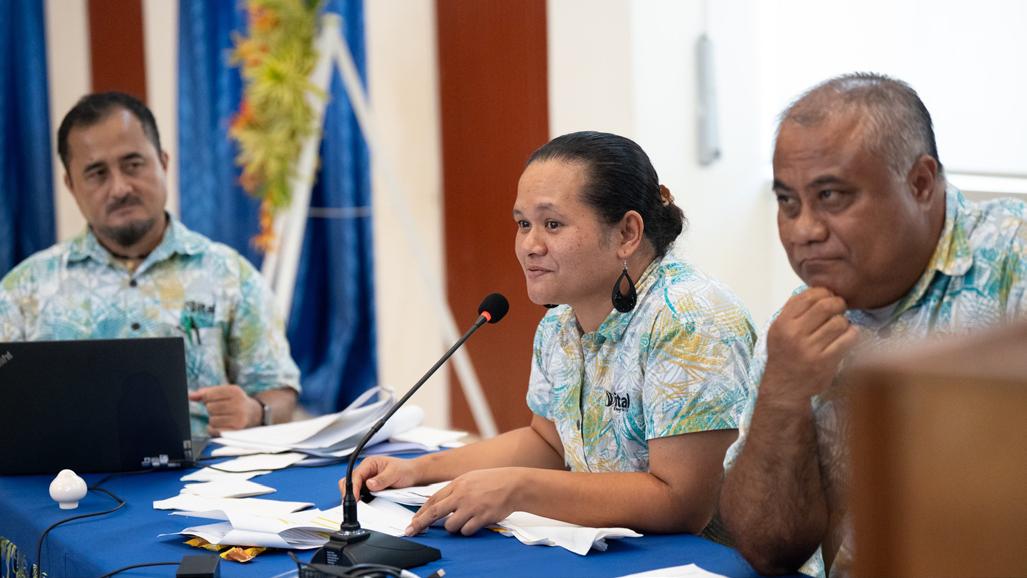
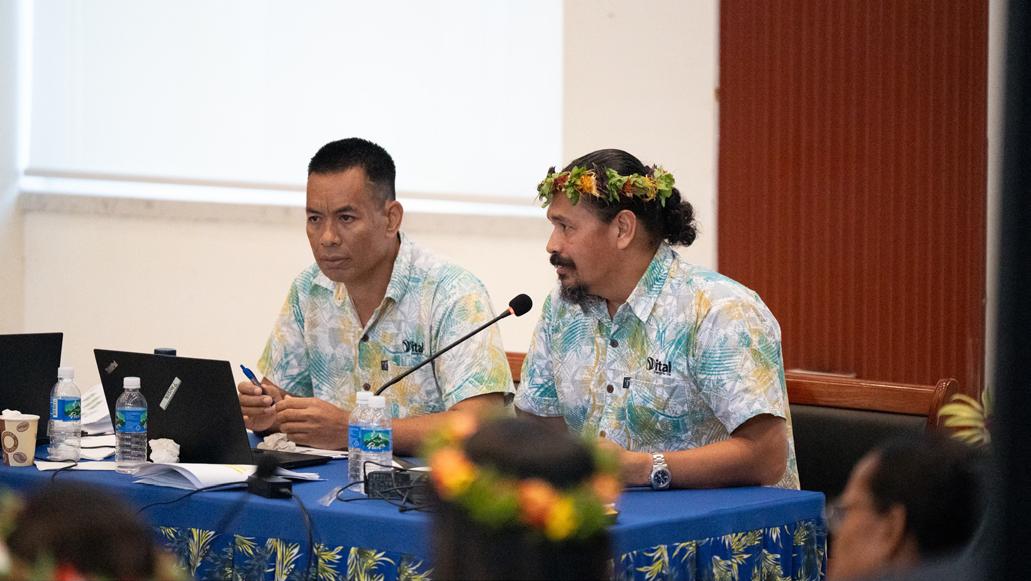
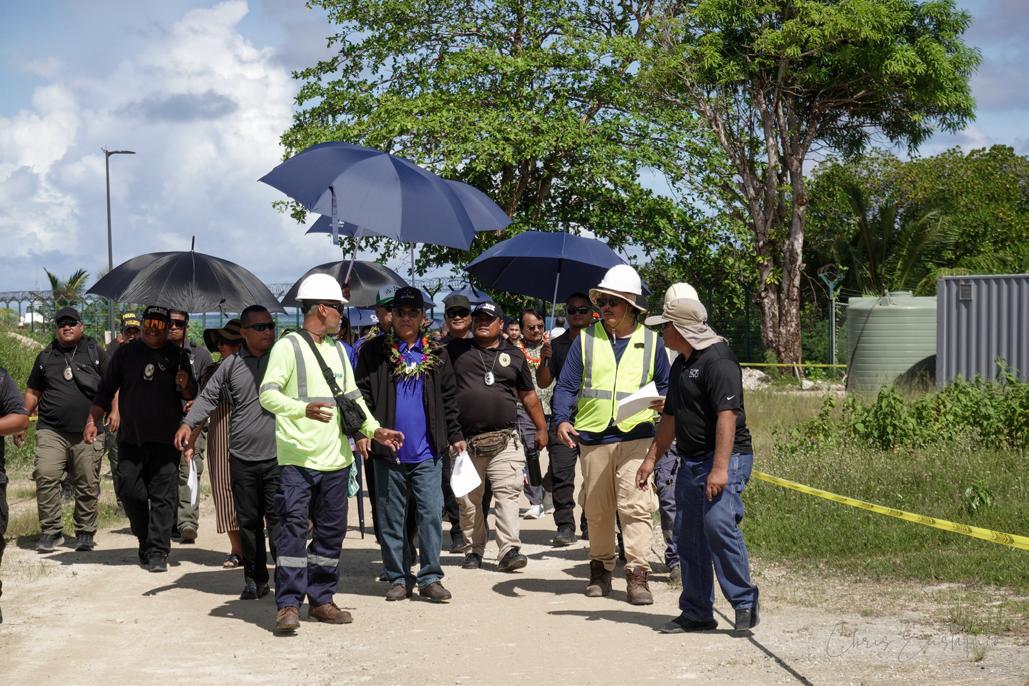
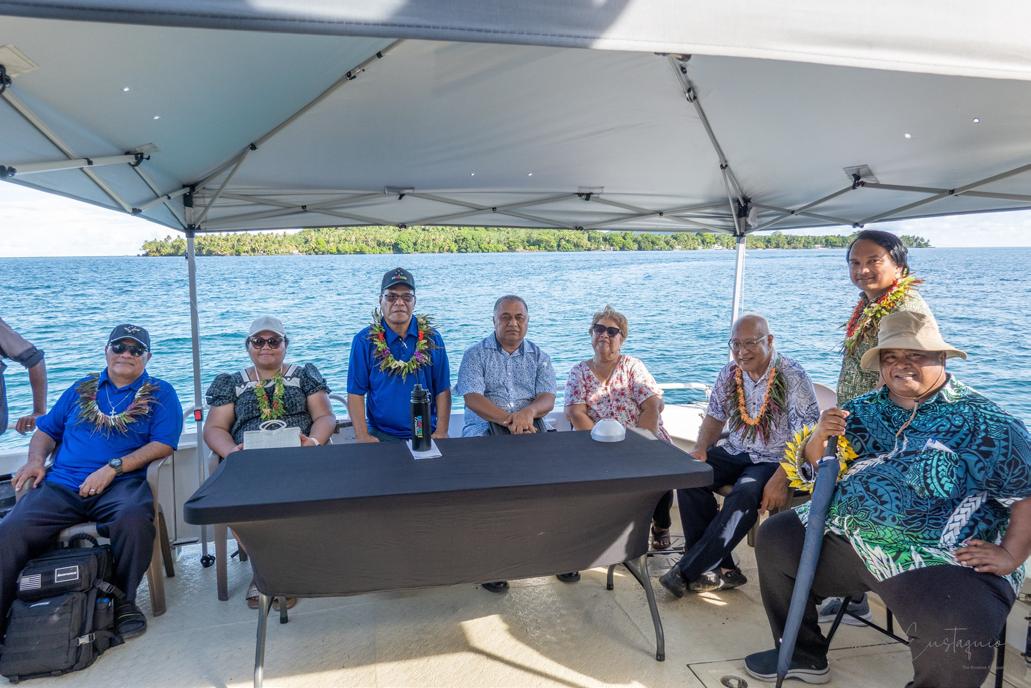

Young Pacifika Wayfinders
21 July 2025
Suva, Fiji – For the first time in the Pacific, 14 adolescent boys aged between 15 and 19 years have come together as the Young Pasifika Wayfinders* to ensure that young people’s rights, empowerment, and voices across a wide range of issues are given the importance it strongly needs. Launched and supported by UNICEF, the group will also provide advice and feedback on UNICEF Pacific’s work with and for adolescents - including policy, advocacy, programming, and overall strategy.
“We have been learning and discussing issues like mental health, cyberbullying, online safety, climate change, and gender stereotypes. We are looking at how these influence adolescents across the Pacific,” said 17-year-old, Tereora, from the Cook Islands. “We don’t just follow the tide - we shift it. We carry the strength of our ancestors and the hopes of our future. Every conversation,
Kevin Petrini, Deputy Resident Representative, UNDP North Pacific Office
When I boarded a plane to Samoa 24 years ago, I wasn’t looking for a career-I was looking for meaning.
I had a degree in engineering, job offers lined up, and yet something in me said: Not yet.
I didn’t know then that this choice, joining the Peace Corps, landing on an island halfway around the world, would shape not just my career, but the way I move through life.
Samoa taught me things no classroom could: how to slow down, how to listen, how to live in community. I learned the language, made a home, found the love of my life, and in those years, I realized something simple but profound: fulfillment doesn’t come from chasing titles; it comes from showing up, fully, where you are.
The Pacific, however, wasn’t done with me.
My path eventually led me to UNDP in 2008, and I spent much of my
every step forward, helps create safer spaces for young people like us. The change starts with us, and we will not stop until our voices are heard, and our communities healed.”
In the Pacific, 40 per cent of the population are under 18 years of age. Yet, adolescent girls and boys do not always have access to safe spaces where they can voice their thoughts, influence policies, and create meaningful change.
Adolescence is a critical window for identity formation when values are shaped, and positive behaviours can be encouraged to challenge harmful norms. Engaging boys during this time can improve outcomes for women and girls. This approach recognizes boys’ unique needs and their power to influence change as peers - learning advocacy, respect, and responsibility to become role models who help shift the norms that drive inequality.
This month, members were tasked with co-designing an exciting new website design which is being created for boys and young men across the Pacific.
career based in Fiji, working across climate negotiations, governance reforms, and inclusive development efforts throughout the region. I met extraordinary people: from ministers and community leaders to farmers, fishers, and youth activists, all fiercely committed to protecting their islands and their futures. The work was complex, the relationships even more so, but underneath it all was a shared belief in possibility.
In 2021, when I was asked to open UNDP’s newest Pacific office in the Federated States of Micronesia, it was in the middle of a pandemic. Launching an office at that time was, frankly, chaotic. Borders were closed, supply chains were tangled, everyone was learning to work on Zoom, and nothing went quite to plan. But that’s the thing about the Pacific: even when things fall apart, somehow, they also fall into place.
We built the office, piece by piece, alongside an incredible team and committed government partners. We set up projects in climate resilience, inclusive governance, water security, and more importantly, we created a foundation that will continue to grow long after I’m gone.
“Our first role as adolescent advisors was to a company called Evident, which is partnered with UNICEF. We are supporting them co-design a Pacific online platform,” said 17-yearold, John, from Fiji. “We shared our ideas on how popular culture - games, sports, and even music albums - could look if they reflected Pacific Island culture. Imagine popular online games with island settings and traditional designs. It was exciting to bring our perspectives into spaces that usually overlook us.”
The adolescent boys travelled from their home islands across the Pacific to meet in Fiji for the first time in May this year. They convened at their first activation workshop and worked together to co-design the group, their logo, motto, mission statement and what they stand for.
They also drafted their own social advocacy action plan to identify the ways they can raise awareness amongst peers and communities of the key issues facing adolescents in the Pacific.
A key part of their shared vision of the group is to challenge stereotypes and redefine masculinity, for an equitable moana.
“As a young Pasifika Wayfinder, I speak from the heart, not just for myself, but for all my Pacific brothers. We are sons of the ocean, rooted in culture, tradition, and strength,” said 15-yearold, Alexander, from Fiji. “But behind the strength, many young people carry silent struggles - mental health battles, pressure from school and family, as well as the weight of trying to prove we are man-enough.”
In the coming months, the Young Pasifika Wayfinders will put their advocacy plans into action which will involve designing social media campaigns, collaborating with other youth movements, and organizing events with Pasifika adolescents in their home countries. These actions will help them to connect with the communities that they want to serve and get their input into the challenges they face and how the group can best support.
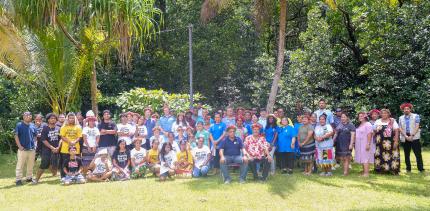
Looking back, what stands out aren’t the project reports or the meetings, but the moments in between: midafternoon laughs with colleagues, learning from local wisdom, fumbling my way through languages (with varying success), and witnessing firsthand the resilience and generosity that define the Pacific spirit.
People often lose patience when things are running late, when plans change, when progress meanders, for me it was an opportunity to learn how to get things done in a different way. A reminder that relationships matter, that time flows differently, that solutions must be rooted in culture, in people, in place.
As I prepare to take up my next post in Sierra Leone, I carry the Pacific with
me, not as a chapter closed, but as a compass set. This region has taught me about patience, humility, and being adaptable. It’s taught me that leadership isn’t about control, but about trust; that service isn’t about fixing but about walking alongside.
I’m grateful for every colleague, every partner, every friend who’s been part of this journey. You’ve challenged me, grounded me, and yes, at times kept me on my toes — but you’ve made me better.
And though the Atlantic awaits, I know this much: I am a Pacific Islander and will be an Ambassador for the Pacific wherever I go and I find comfort in knowing that we are all still connected by our big, beautiful ocean.